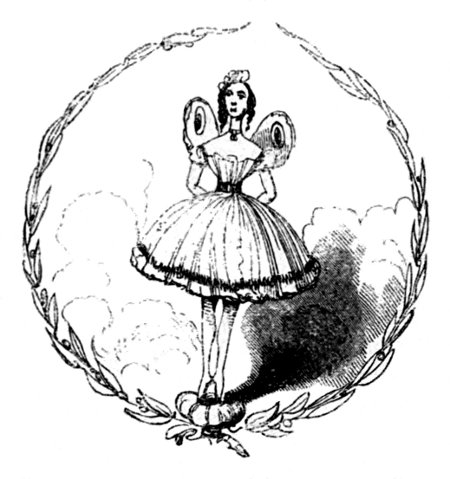
A FIGURANTE.
Title: Comic Arithmetic
Author: Percival Leigh
Illustrator: Alfred Crowquill
Release date: June 28, 2014 [eBook #46120]
Most recently updated: October 24, 2024
Language: English
Credits: Produced by Chris Curnow, mirjam and the Online Distributed
Proofreading Team at http://www.pgdp.net (This file was
produced from images generously made available by The
Internet Archive)
TRANSCRIBER'S NOTE:
The cover image was created by the transcriber and is placed in the public domain.
Inconsistencies in hyphenation and spelling have not been corrected. Punctuation has been silently corrected. A list of other corrections can be found at the end of the document.

A FIGURANTE.
"Go the whole figure."—Sam Slick.
LONDON:
RICHARD BENTLEY, NEW BURLINGTON STREET.
1844.
LONDON:
R. CLAY, PRINTER, BREAD STREET HILL.
LIST OF ILLUSTRATIONS.
"Good wine needs no bush," and, therefore, little by way of preface is necessary to this Work. "He who is ignorant of arithmetic," says Archimedes, "is but half a man." Therefore, for the sake of manhood, which drapers'-boys and lawyers'-clerks attempt by means of mustachoes and penny-cigars, read this Work,—for if the dead abstractions of this science will make a man, what must the living realities do?—Nothing less than a Phœnix D'Orsay, which is at least 1 man ¾ and ⅝.
Read this book, then, my friends, young and old. It teaches practical philosophy in every [2] chapter; wisdom in every page; and common sense in every line. Get this manual at the fingers' ends of your mind, and your physical and mental powers will be so expanded that you will be able to catch a comet by the tail; take the moon by the horns; knock down the great wall of China, à la Cribb; or measure the spectre of the Brocken for a pair of breeches, and thus cut a pretty Figure.
Arithmetic is the art or science of computing by numbers. It is national, political, military, and commercial. It is of the highest importance to the community; because it pre-eminently teaches us to take care of Number I. Our ministers succeed according to their knowledge of the science of numbers. Witness the skilful management of majorities of the lower house.
He who understands the true art of Addition, Subtraction, Multiplication, and Division, as here laid down, will not be considered a mere cipher in [4] the world; but will, in all probability, make a considerable figure: and in the figurative words of Horace, be "Dives agris dives positis in fœnore nummis."
Let us, therefore, under the guidance and protection of that god of honest men, the light-heeled and light-fingered Mercury, be diligent so to add to our store by subtracting from the stores of others, that we may add to our importance. Let us so multiply our resources, by encouraging division among our contemporaries, that we may see their reduction in the perfection of our own practice.
EQUALITY.

"WHO ARE YOU?"
= Equality. The sign of equality: as, "A living beggar is better than a dead king;" or both being dead, are equal to each other.

— Minus, less. The sign of subtraction; as, for instance, an elopement to Gretna; or, a knocking-down argument by the way-side, — minus ticker. Take from — from take.
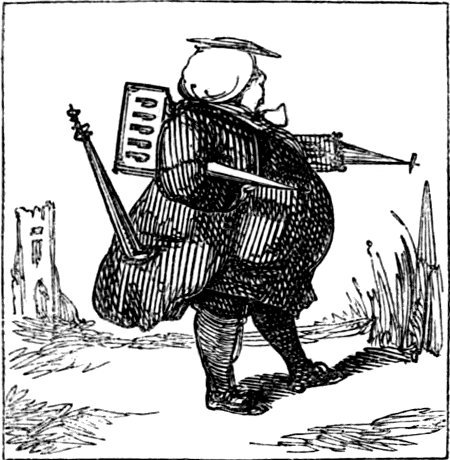
A PLURALIST.
+ Plus, or more. The sign of addition; as, 3 livings + to 1 = 4; or, 5 millions of new taxes + to 48 = 53.
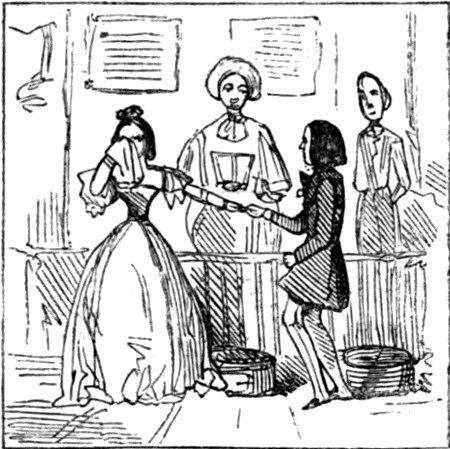
THE SACRED HALTAR.
× Multiplied by. The sign of multiplication: as, "The sun breeds maggots in a dead dog."—See Shakspeare. Or, "Money makes money."—See Franklin. Or, Anti-Malthus.—See Ireland.
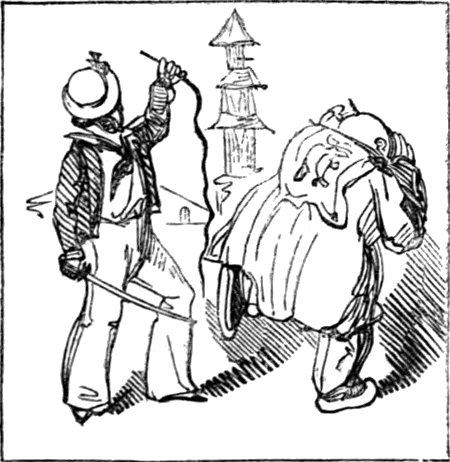
DIVIDING THE CHINESE, A CUTTING JOKE.
÷ Divided by. The sign of division. Example [8] 1. The Whigs.—2. The Church. A house divided against itself. Division of property; the lion's share, &c.
Is to: so is:: As Lord B—— is to Bishop P——, so is a blue musquito to a planter's nose.
As Sir R—— I—— is to J—— H——, so is a pair of donkey's-ears to a barber's-block.
As Tommy Duncombe is to Lord Stanley, so is shrimp-sauce to a boiled turbot.
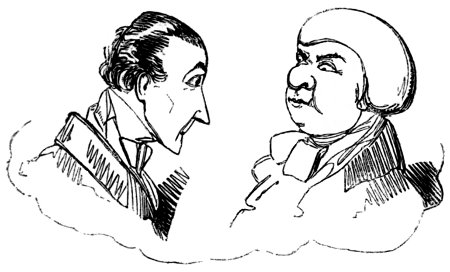
THE POOR CURATE. THE BISHOP.
Numeration teaches the different value of figures by their different places (see Walkinghame, Court Guide, Law List, &c.); also the value of ciphers, or noughts, according to their relative situations (see Intellectual Calculator, or Martin's Arithmetical Frames). As regards the value of figures in places, we have illustrations in sinecures [10] of all grades, from the Lords of the Treasury to the meanest underling of the Stamp-Office.
Place and pension make the unit a multitude, according to the position of the noughts,—that is, that large portion of the public called the nobodies. The more a man is surrounded by his inferiors, the greater he becomes. Hence the necessity of restrictive tariffs to prevent wealth in a community,—and of impediments to education. It is not, therefore, naughty for our betters to keep us down by any kind of mystification; as the sun always looks larger through a fog.
The value of figures and of ciphers will be well understood in the following table, which ought to be committed faithfully to memory. It will be seen that when the noughts, the nobodies, that is, the people, go before the legislative units, their value is consequently decreased; but when they follow as good backers in good measures, the value of the characters is increased ad infinitum.
| The good old times. | ||||
| P E O P L E . | – | 1 | King. | |
| 20 | Lords. | |||
| 300 | Tithe-eaters. | |||
| 4000 | Quarrel-mongers (lawyers). | |||
| 50000 | Men-killers (army). | |||
| 600000 | Land-swallowers (landlords). | |||
| 7000000 | Dividendists. | |||
| 80000000 | Pensioners. | |||
| 900000000 | Sinecurists. | |||
| The new system, or march of intellect. | ||||
| King | 100000000 | – | P E O P L E . | |
| Lords | 20000000 | |||
| Tithe-eaters | 3000000 | |||
| Quarrel-mongers | 400000 | |||
| Land-swallowers | 50000 | |||
| Dividendists | 6000 | |||
| Men-killers | 700 | |||
| Pensioners | 80 | |||
| Sinecurists | 9 | |||
Our life is an addition sum; sometimes long, sometimes short; and Death, with "jaws capacious," sums up the whole of our humanity by making the "tottle" of the whole.
Man is an adding animal; his instinct is, to get. He is an illustration of the verb, to get, in all its inflexions and conjugations; and thus we get and beget, till we ourselves are added to our fathers.
There are many ways of performing addition, as in the following: a young grab-all comes upon the fumblers at long-taw, as Columbus did upon the Indians; or, as every thrifty nation does upon the weak or unsuspicious, and cries "Smuggins!"
[13] Addition is also performed in a less daring manner by the save-all process, till Death, with his extinguisher, shuts the miser up in his own smoke.

A SAVE-ALL.
Addition may also be performed by subtraction by other methods. It is one to make "Jim along Josey!" the watchword, as Joey does in the pantomime.
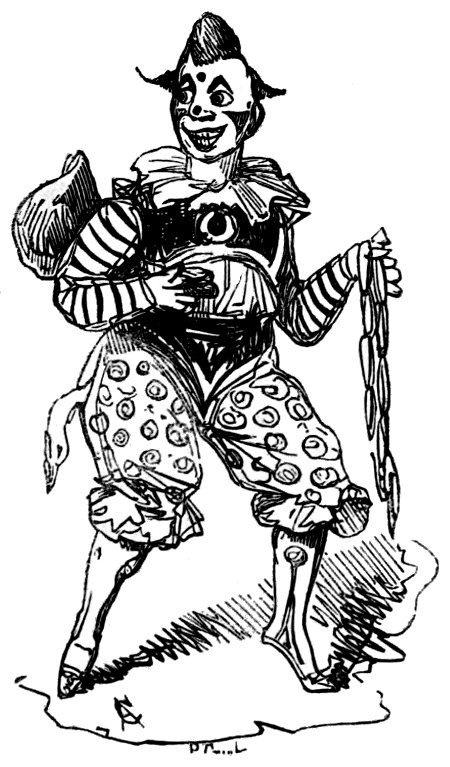
MIHI CURA FUTURI.
Addition teaches, also, to add units together, and to find their sum total, as A + B = 2. A bachelor is a unit; a Benedict, unitee.
Matrimonial Addition.—By common ciphering 1 and 1 make 2. But, by the mathematics of matrimony, 1 and 1 will produce from 1 to 20, arranged in row, one above another, like a flight of [15] stairs. They make a pretty addition to a man's effects, as well as to his income; and, if not themselves capital, are a capital stimulus to exertion. Surrounded by these special pleaders, a man becomes as sharp-set as a Lancashire ferret, and looks as fierce as a rat-catcher's dog at a sink-hole. Such men ought to be labelled, "Beware of this unfortunate dog!" for he would bite at a file!

A MAN OF MANY WOES.
Adding to your name.—This is another mode of performing addition. It is not necessary to go [16] to an university for this, any more than it is necessary to go to a church to get married. The thing can now be done without it. Schoolmasters, and pettifoggers of all kinds, will find this an excellent piece of practical wisdom.
To go back a little to first principles, which should never be lost sight of in the teaching of any art or science, we must set forth the grand leading rule before our pupils. Addition teaches, therefore,[19]
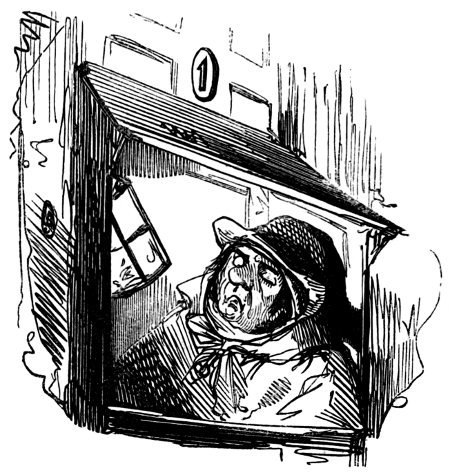
The man who takes care of No. 1.
Subtraction teaches to "take from" or to find the difference of two numbers; having taken too much in, and slept out; to find the difference in sovereigns and shillings between that and sleeping at home according to the "conventional laws of virtuous propriety." (Vide Miss Martineau.)
The figures are to be arranged in subtraction one under the other; that line expressing the [24] highest number, being placed above the line expressing the smaller number. In this arrangement, the upper line is called the subtrahend, and the lower the subtractor; the difference is called the remainder. Our readers, the million, are the subtrahend. The following are subtractors:—
The Rule of Subtraction is perhaps the most useful in either national, political, or commercial Arithmetic; "Take from" being the universal maxim of mankind from the day that Adam and Eve stole the forbidden fruit. In sacred history we find various exemplifications of the principle: Jacob made use of it when he obtained his brother's birthright and his blessing; David, when he took the wife of Uriah. Profane or classical history abounds with examples. It was the royal and sacerdotal rule, in all climes, countries, and [25] times. Kings have grown thrifty by it, and conquerors invincible. "Take from" is, in short, the motto of the legislators; and rhetoric the soldier's watchword, the prince's condescension, the courtezan's smile, the lawyer's brief, the priest's prayer, and the tradesman's craft. The use of this rule, is to enable us to "do one another," not "as we would be done," without the contravention of the majesty of the law.
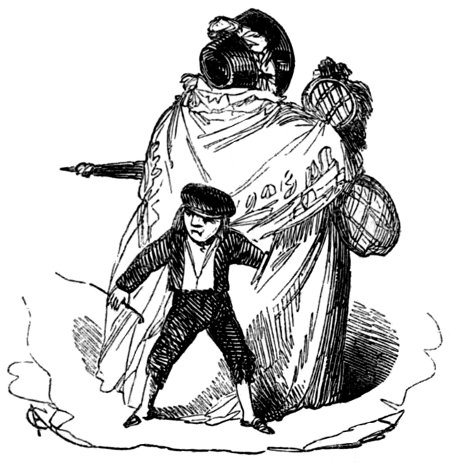
We have had some amusing ways of performing this rule in "by-gone ages." Among the most celebrated, were Indulgences and Benevolences. They worked well for those who worked ill, and led to a multiplication of heresies.
Subtraction is perhaps one of the most fashionable of all the rules; and any one who sets himself down for a gentleman must expect to be beset by a swarm of hungry locusts, who make a rule to bleed him at every pore till he becomes poor. When Edward the First took the wealth of the Jews and their teeth at the same time, he showed a fatherly consideration for those who having nothing to eat wanted neither incisores, cuspidati, bicuspidæ, or molarii. But we are to be nipped, and squeezed, and tapped, and leeched, and drained to all eternity, and are still expected to—give.
To take in.—This rule not only teaches us to take from, but also to take in, which is to take from, with true tact and skill. England is the [27] Land of Goshen in this particular, and Smithfield the focus of the art, whence the first rule for selling a horse is—
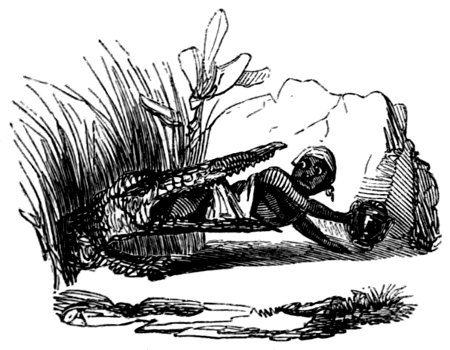
TAKEN IN AND DONE FOR.
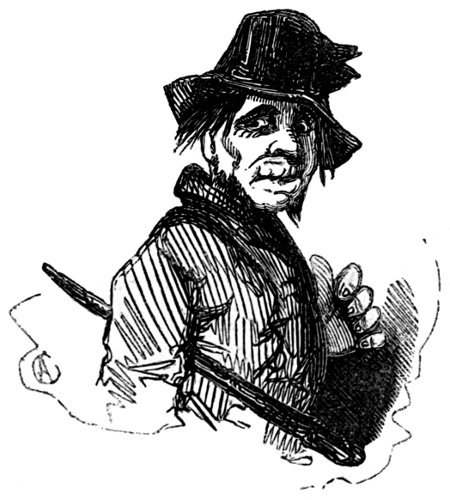
"who steals MY purse steals trash."
The rules already given for performing this branch of arithmetic apply to money matters; but the perfection of the art consists, not in simply taking from another what you want yourself, but that which does not enrich you, but makes him poor indeed. This has been styled, by way of eminence, the devil's subtraction, being the general essence of the black art. It is called Detraction.
[29] Detraction may be performed in a variety of ways, as for example:—"Oh, I know him—his great grandfather was—but no matter, and his mother—no better than she should be, but I hate to speak evil of the dead. I have enough to do to mind my own business—and yet one cannot help knowing—but yet nobody knows what he is or how he gets his money. He makes a show certainly, but I like things to be paid for before they are sported. His wife, too—what was she, do you suppose? As I have heard, a cook in a tradesman's family.—Well, a cook is not so bad after all—I am sure it is better than a doctor. But I believe he was forced to marry her.—Poor woman, she suffered, I dare say—Well, it is well it is no worse—It was the only amends he could make her—It would have been a cruel thing for the poor innocent children to be born illegitimate.—But he is still very gay—These sort of men will be—but there will be an exposé some day. Things can't go on for ever—Well, I wish them no harm, poor creatures—But do you go to their party to-night?—I go only for the sake of seeing how madam cook conducts the entertainment."
[30] Rule for Ladies With Regard To Their Rivals.—Should any lady be so unfortunate as to fear a rival in the affections of some simple-hearted swain in the personal attractions of some youthful beauty whom he has never seen, it must be her method not to vilify her character or underrate her accomplishments,—no, this is but sorry skill. The more delicate and refined way of subtracting from her merits will be to employ unbounded panegyric, so as to raise the expectations of the feared admirer, that the real shall fall infinitely short of the ideal. This is another mode of performing subtraction by addition.
Literary Subtraction.—This is of essential service to editors, reviewers, and others, who, having nothing good of their own with which to amuse the public, steal the brains of others.
Rule.—Take from a work published at a guinea all its cream and quintessence, under pretence of praising it into immortality through the pages of your fourpenny review. "Castrant alios, ut libros suos per se graciles alieno adipe suffarciant."
[31] Mercantile Subtraction.—It is well understood in this country, that no honest man can get a living, in consequence of the extraordinary competition among us. It is therefore considered legal and justifiable for the baker to "take toll" and make "dead men;" for the licensed victualler to make "two butts out of one;" for the wine-merchant to "doctor" his port; for the butcher to "hang on Jemmy;" for the printer to make "corrections;" for the tailor to "cabbage;" for the grocer to "sand his sugar and birch-broom his tea." The milkman "waters his milk" by act of parliament; and to show that all this is in the order of Providence, the rains of heaven wet the coals.
National or Political Subtraction.—There is one part of the New Testament which all Christian rulers have religiously observed, namely, "Now, Cæsar issued a decree that all the world should be taxed." The art of taxation is, therefore, not only a religious obligation, but is the science of sciences and the most important part of National Arithmetic.
Taxation is necessary just as blood-letting is necessary in plethora. Over-feeding produces a [32] determination of the blood to the head, and then radical rabidity breaks out into rebellion. Over-feeding requires bleeding. There is a tendency in every industrious nation to get on too fast. Taxation is the fly-wheel which softens and regulates the motion of the national machinery, the safety valve which prevents explosion, while that accumulation of taxation called the dead weight is a "clogger" to keep things down.
Whenever there is a "rising," it is a sure sign that taxation is too light; consequently taxation should be so accommodated to the habits, tastes, and feelings of the people, as to fit them at all points, like well-made harness. If they grow too enlightened we can double the window-tax; if they be disposed to kick, put on the breeching in the shape of an income-tax; if they go too much by the head, we can raise the price of malt, and, by way of a martingale, put a duty on spirits; if they jib, we can touch them on the raw with "the house duty;" if they step out too fast, tighten the "bearing rein" by 10 per cent. on the assessment; and should any attempt be made to bolt, we can secure them with a curb, by a tax on absentees.
[33] The perfection of taxation is to make it as much as possible like an insensible perspiration; or to cause it to subtract, like the vampire when lulling the victim to sleep, by fanning him with the wings of patriotism and the hum-hum of a liberal oration, on the principle of

"FORKING UP."
Multiplication teaches a short way of adding one number together any number of times. Its sign is a cat o'-nine-tails; its symbol a whipping-post. Since the wonderful powers of the number nine have been publicly discussed, we have had no more shooting at her Majesty, (Heaven preserve her!) which shows the transcendant powers of arithmetical argument. The Egyptian plague of frogs and flies exemplifies this rule. In Modern Rome we have multiplication of fleas. In Modern Babylon we have multiplication of bugs, particularly humbugs. In the West Indies we have [35] multiplication of musquitoes and piccaninies, and in the East, multiplication of oneself, as in the case of Abbas Mirza and his 1000 sons for a body guard.
Multiplication of Laws.—This is a favourite amusement with our modern legislators. It naturally leads to the multiplication of lawyers, whose proper calling is to set people together by the ears, for the multiplication of dissensions. The original type of this order was the plague of locusts.
Domestic Multiplication, or Multiplication of miseries. This rule is performed by taking unto oneself a wife for better or worse; then, multiplying as usual, and, at the end of fifteen or twenty years, having the young "olive branches" round about our tables.
Multiplication of Money.—This is the most universal case in the whole rule. The multipliers are the operatives, who are placed at the bottom, instead of the top of the arithmetical scale. They may be ranged, in general, as in the following:—[36]
These digits are to be worked from fourteen to sixteen hours a-day at the lowest possible fraction of pay. The product is to be set down in the 3½ per cents. or invested in the first unjust war in which this nation may be engaged; or the whole aggregate of sums may be multiplied by monopoly.[37]
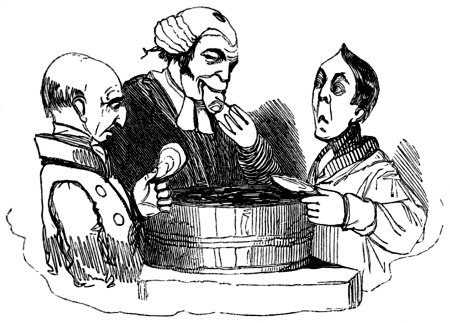
LAWYER DIVIDING THE OYSTER.
Division teaches how to divide a number into two or more equal parts, as in the division of prize-money.
[39] Division is of great importance, whether political, ecclesiastical, commercial, civil, or social. Nothing is more likely to destroy your opponents than a split. Divide et impera is the true Machiavelian policy of all governments.
Numbers, that is the multitude, are to be divided, in a variety of ways,—by mob orators, or by mob-sneaks, or by parliamentary flounderers, or by mystifying pulpit demagogues.
The divisors should generally endeavour to work into their own hands, and the dividends may be compared to fleeced-sheep, plucked-geese, scraped sugar-casks, drained wine-bottles, and squeezed lemons.
Social Division.—The divisions here may be a tale-bearer, a gossip, or a go-between, and the divisors will "separate" to fight like Kilkenny cats, leaving nothing behind but two tails and a bit of flue. In a township, a volunteer corps is an excellent divisor: you may kill the adjutant by way of a quotient, on the surgical principle of "Mangling done here."
In the division of property by will, be your own lawyer, and your property will be divided to [40] your heart's content; for, as your heirs will most assuredly be divided amongst themselves, when they have done fighting over your coffin for what does not belong to them, they will call upon the Court of Chancery to divide it—principally among the lawyers, according to the lex non scripta.
In the division of profits, first take off the cream three times, and then divide the milk.
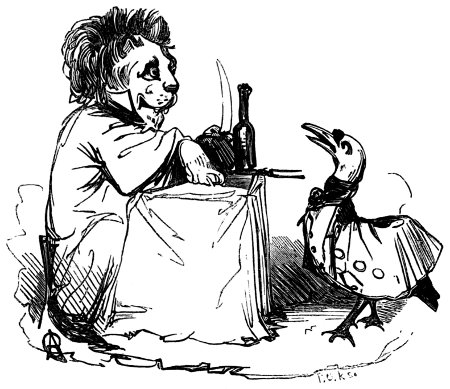
THE LION'S SHARE.
In all kinds of "Division of Money" endeavour to carry out the principle of the fable. Like the [41] lion when dividing the spoil, consider that you have a right to the first part, because you are a lion; to the second, because you are strong; to the third, because no one dares dispute your right; and to the fourth, because no one is so able as yourself to defend it. This is the lion's share.
Division of Time.—"Tempus fugit," and therefore the due systematic and proper division of time, in a rational manner, is the bounden duty of every "beardling." All philosophers and some kings, whether from Democritus to Tim Bobbin, or from Alfred the Great to that merry old soul, "Old King Cole," have divided their time equitably, according to the maxim of Horace, "Carpe diem, quam minimum credula postero." Modern life teaches and exhibits the same necessity for the rigid division of the "stuff life is made of," and the twenty-four hours may be systematically divided, with great advantage, by young men, as follows:—
| HOURS. | |||
| 1. | To yawning, vertigo, head-ache and soda-water, say from one to three, A.M. | 2 | |
| 2. | From pulling off the night-cap to putting the first leg out of bed | 1 | |
| [42] 3. | To "cat-lap," "broiled chickens," Lackadaisical Magazine, "Dry Punch," and Gazette of Fashion | 2 | ½ |
| 4. | To the study of "cash stalking," the art of post-obits, with lessons from Professor Mœshes on the science of "Bondology." (Nocturnâ versate manu, versate diurnâ) | 1 | |
| 5. | To lounging, "dawdling," "muddling," sauntering, losing oneself in "ins and outs," "nowheres," &c. | 1 | ½ |
| 6. | To dressing for dinner, to getting on a pair of boots, half an hour, swearing at coat quarter of an hour, selecting vests half an hour, cursing pantaloons quarter of an hour, shaving, and other unnecessaries | 2 | ½ |
| 7. | To dining, wineing, brighting the eye, doubling the cape, getting half seas over, going into port instead of finding a champaign country | 2 | |
| 8. | To dressing for opera, "titivating," "bear's greasing," curling, barbarizing, scenting, putting on opera countenance, and ogling | 1 | ½ |
| 9. | To tying on stock half an hour, to putting on gloves quarter of an hour, to curling whiskers half an hour, to laying on the rouge, &c. | 1 | ½ |
| 10. | To bowing, scraping, hemming, hawing, yawning, toying, soft-sawdering, salooning, staggering, cigaring, coaching, and finishing | 3 | ½ |
| 11. | To no one knows what—Nisi castè saltem cautè | 5 | |
| 24 | |||
Long Division is so called when a long time is taken for the division of various sums, as in the case of the Deccan prize-money, or the Duke of York's debts. In these cases, various persons are [43] placed in the state of longing—hence the name of the rule, which is a figurative exemplification of "hope deferred."
Rule I—Teaches to work an expected legacy or an estate in reversion, or a right of entail, with a "post-obit bond," cent. per cent. on a stiff stamen.
Rule II—Teaches how to wait for a living instead of working for one. This is a hungry expectancy: yourself, in a consumption, with an interesting cough, preaching as curate to an admiring congregation principally composed of females, who bring jellies and jams, pitch-plasters, electuaries, and pills, "bosom friends," and other comforters, while the jolly incumbent, with his rosy gills and round paunch, writes you once a quarter to dine with him, to see how well he holds it.
Rule III. Chancery Long Division.—This is an exemplification of the "law's delay," and the rule is to be worked by giving the expectants the "benefit of a doubt," which is not quite so pleasant in Chancery as in criminal practice. The "Bidder" of this rule was John Lord Eldon.
[44] Rule IV.—Beside long annuities, there are also long dividends. For instance, in the case of Bamboozle, Humbug and Co. who lately declared the third and last dividend of three-fourths of a farthing in a pound, for the benefit of their creditors.
THE INSOLVENT TRAP.
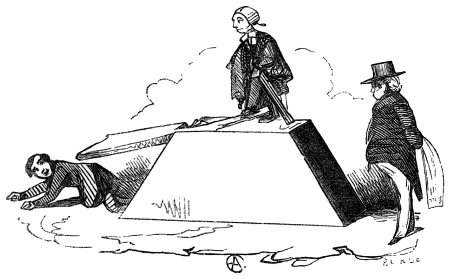
"THE LAW BINDS, BUT THE LAW LOOSES."
Reduction is properly the "art of sinking." It teaches us, according to Martin, to bring numbers to a lower name without altering their value. When numbers are brought to a higher name, it is called Reduction ascending, when to a lower, Reduction descending.
Reduction ascending is to stand high in your own estimation, from the convincing reason, that, as no one thinks anything of you, you ought to think something of yourself. The visit of the Queen to Edinburgh raised the baillies so high in their own estimation, that it took them three hours to get up in a morning.
[46] Examples of Reduction ascending are to be found in the following cases:—When a noodle is made a lord; 2. When Timothy Fig obtains a baronetcy; 3. When Muggins keeps his "willa;" and when a beggar gets on horseback.
Reduction ascending for Females.—Mrs. General Swipes, Mrs. Colonel Trashee, Mrs. Major Minus, Mrs. Alderman Bumble, Mrs. Common-sergeant Sprigings, Mrs. Common-councilman Snigings, Mrs. Executioner Ketch, Mrs. Beadle Blow-em-up, Mrs. Corporal Casey.
Reduction ascending is to be seen in the manufacturing districts; when the body politic gets inflated, a "rising of the lights," that is, of the illuminati, may be expected. In these risings the scum always gets uppermost, and some political demagogue is ejected to parliament by a revolutionary eruction—to be reduced to his own level as a leveller.
Reduction descending.—
[47] This is the "old saw" Alderman Harmer used when he cut the city—or Lord John in his "finality" speech—cut his own fingers.
There have been many examples of Political Reduction both in our last and present ministry. The reduction of postage, so that it paid less than the cost, was an exceedingly business-like act. The reduction of cats'-meat in the storehouses at Plymouth, Woolwich, Portsmouth, and Chatham, from a penny to three farthings a-day, was also an example of legislative wisdom, and proved the maxim, "Sparus at the speketas letouat the bungholeas."
The reduction of paupers' food to "doubly diminutive and beautifully less" than that of the felon, is also "wisdom wonderful;" being a new way of offering a premium upon crime, at about thirty and a third per cent. It is presumed to have occurred with a view to the assistance of Old Bailey practice, and of the Poor Law [48] Commissioners, as it promotes Coroners' inquests and saves coffins.
Rule for the Reduction of Paupers.—Take "an operative," starve him in the streets till he becomes light enough to make a shuttlecock of, then place in his hands an order from an Edmonton magistrate, by way of a feather; bandy him about from parish to parish till you are tired of the game. Let him then fall into the lock-up of the station-house. Keep him sixteen hours in a cold cell without food. Bring him before the Board, put him on the refractory diet, water-gruel, poultice dumplings, and rat roastings. Keep him till he becomes so thin as to lose his shadow, then turn him into the streets to look for a job, with three yards of cord in his pocket, and a direction to the nearest lamp-post, as an intimation of what that job is to be.
A state may be reduced in the same way by nip-cheese patriots. Such "save-alls," when they lop off excrescences, bark the trunk—when they prune redundances, let loose the sap. These "flint-skinners" grind down professions, pare down dignities, sweat sovereigns, purge the [49] commonwealth, scour landlords, skin the army, starve the navy, scrape religion to the backbone, sell the honour of their country for a mess of porridge and its glory for a bag of moonshine; till at last John Bull becomes as lean as a country whipping-post, and would hang himself, only he has not weight enough on him to produce strangulation.
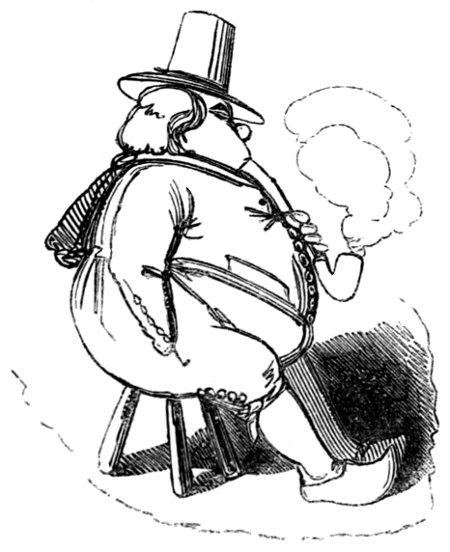
"BLOWED PUFFERY."
Proportion is sometimes called the "Rule of Three," because a certain system of conventionalisms has its origin in that, which is called, by way [51] of joke, the "Three Estates" of the realm—King, Lords, and Commons; in other words, a parliament, so called from its being the focus of palaver, in which originate those splendid specimens of collective wisdom, known by the name of Acts of Parliament—because they "won't act."
The theoretic proportion is, that numbers should be exactly balanced,—that one sovereign should equal six hundred lords, that six hundred lords should equal six hundred and fifty-eight commoners, and that these should represent twenty-nine millions of people. Now, as the interests of each of these estates are said in theory to be opposed to each other, and as they are all theoretically supposed to pull three opposite ways with equal force, it must follow that legislation would be at a stand still, by the first law of mechanics, viz. that action and reaction are always equal: but to prevent such a catastrophe of stagnation, and to set in motion this beautiful machine, a pivot-spring, in the shape of a prime minister, or prime mover, is superadded, and a golden supply, fly, or budget wheel, is introduced, by which the following subordinate, yet ruling principles are developed; [52] and thus we go on from age to age, making laws one day, and unmaking them the next, for the sake of variety.

"OUT OF PROPORTION."
It must not be forgotten that this rule is one of proportionals, as its name imports. It therefore teaches proportion in all its relations, social and political; it is the rule of our country, and seeks to develop that beautiful equality and justice, so conspicuous in all our institutions, exemplified in the following well-known legal and constitutional maxim, viz. "One man may steal a horse, but another must not look over the hedge."
It is a maxim of English law, that punishment should be proportionate to the offence, and have a relation to the moral turpitude of the offender. Hence the seducer and adulterer only inquire, "What's the damage?" By the same rule, it is held highly penal to sell the only ripe fruit in England, roasted apples; and the stock in trade of the basket woman is confiscated. She, too, is [54] sent to the Counter—because she is not rich enough to keep one with a shop attached.
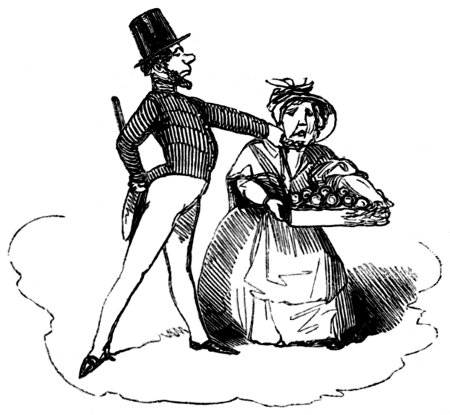
CALLED TO ACCOUNT.
This brings us to the rationale of reward, and shows us the policy of making a prison superior to a poor-house. This wise arrangement of the collective wisdom of the Rule of Three (the three estates) is upon the principle of counter-irritation, that is, the best way to administer to the miserable is to inflict more misery, just as we put [55] a blister on one part to subdue inflammation on another, or set up a mercurial disease to cure a liver complaint. On the other hand, we cure villany by increased rations of beef, bread, beer, and potatoes, in accordance with the maxim, that "the nearest way to a man's heart is through his stomach."
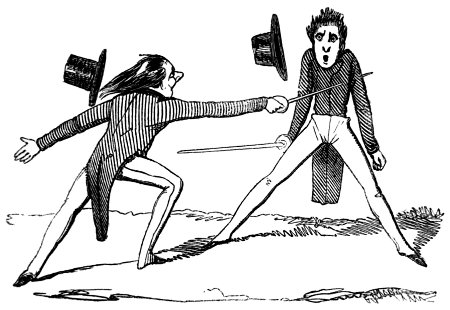
On the same principle of "Proportion," the operative is to have for his share the pleasure of [56] doing the labour; for if one man had the labour and the gains too, it would be abominable, and destructive to all the usages of society.
It is also strictly proportional, that we should pay not only for what we have, but for that which we have not. Thus church-rates ought to be inflicted, not so much for the benefit of the church, but as the substitute for that wholesome discipline of flagellation, unhappily discontinued, and for the "good of the soul;" for if the spiritual benefit be great to those who pay for what they receive only, how great must be the reward of those who are content to pay for that which, they not only do not receive, but which they will not have at any price! Hence, it is possible that even dissenters may be saved—the trouble of spending their money in other ways.
The "Tax upon Incomes" affords also a striking example of the doctrine of Proportionals. It is so beautifully equalized, that the loss upon one branch of trade is not to be set off against the gain of another, the object of the act being, no doubt, to put a stop to trade altogether, as the best means of placing things statu quo, the grand desideratum of modern legislation.
[57] "Bear ye each other's burdens" is a sublime maxim. The principle of the lever is well brought to bear in the doctrine of proportionals—and shows how to shift the weight of taxation from the shoulders of the rich upon those of the poor—
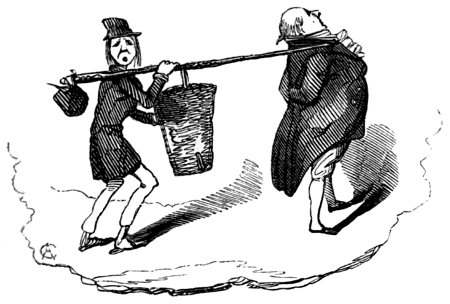
A SLIDING SCALE.
The laws and regulations for the conduct of our civil polity and social condition being founded on these divine principles, it is assumed as a fundamental maxim, that "great folks will be biggest," and he who has not learned that this is the ideal of [58] true proportion, and who does not recognise it in his practical philosophy, will be compelled to knock his head against a wall to the day of his dissolution.
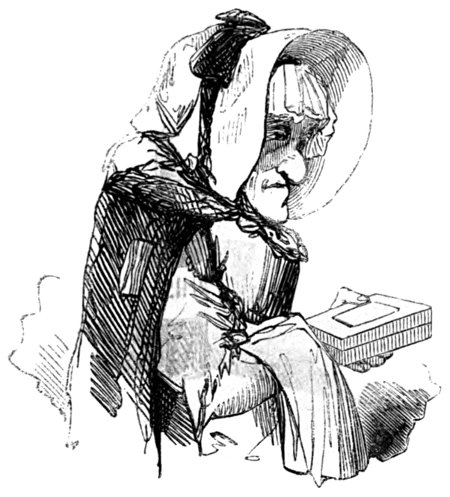
"BROKEN DOWN."
The word Fractions is from the Latin "Fractus," broken. A Fraction is therefore a part or broken piece. A broken head is a fraction; a broken heart is a fraction; a bankrupt is a fraction—he is [60] broken up; yet a horse is not a fraction, although he may be broken in—but his rider may have a broken neck, which is called an irreducible fraction. Speaking generally, therefore, a fraction may be considered as a "Tarnation Smashification."

FRACTIONAL SIGNS.
Fractions are of two kinds, Vulgar and Decimal. Vulgar fractions are used for common purposes, and examples may be seen in the plebeian part of our commonalty, such as coal-heavers, costermongers, sheriff's-officers, bailiffs, bagmen, cabmen, excisemen, lord-mayors, lady-mayoresses, carpet-knights and auctioneers.[61]
Vulgar fractions may be known by the way in which they express themselves. They are more expressive than decimals; and the words, Go it, Jerry—Jim along Josey—What are you at?—What are you arter?—Variety—Don't you wish you may get it?—All round my hat—Over the left—All right, and no mistake—Flare up, my covies—I should think so—with those inexpressible expletives which add so much to the force and elegance of our language, may be taken as specimens of Fractions.

"AN ANCIENT AND MODERN MUG."

KNOCKING DOWN THE LOT.
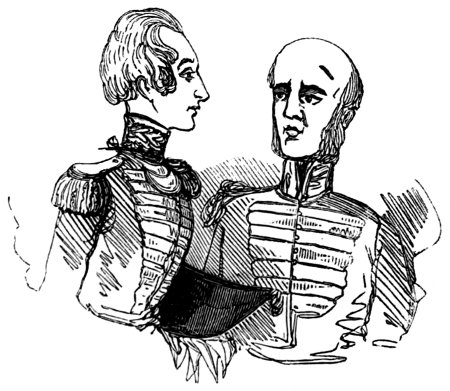
DONE BY INTEREST.
To think of getting on in this world without Interest, is ridiculous. Place and Promotion are not for Fitness or Worthiness, but to serve particular Interests, private or public; and yet a [73] number of very simple persons, who have as large a green streak in them as a sage cheese, without its sageness, are continually wondering that virtue and talent do not get all the "good things" of a vicious community. Punch forbid! Is not virtue declared to be its own reward? and as to talent,—let a man be content with that. It is a positive monopoly to covet wit and money too.
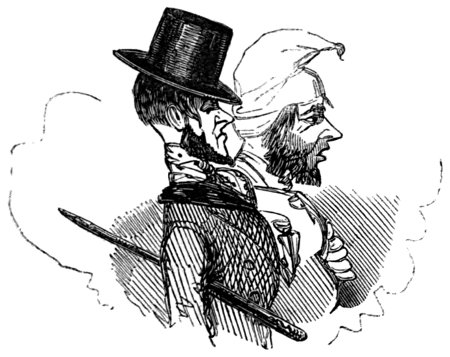
AT A PREMIUM AND DISCOUNT.
To take care of our Interest is the great law of Nature, and is universally followed. Every one for himself, and Fate for us all, as the donkey said when he danced among the chickens, is as profound a maxim as the gnothi seauton of Plato. [74] "Take care of yourself" is of more importance than "Know thyself." To take care of oneself is a science which comes home to every man's business and bosom. It is "wisdom" identified with our personal character. It is philosophy turned to account. It is morality above par. It is a religion in which "every man may be his own parson," find his Bible in his ledger, his Creed in the "stock-list," his Psalter in the tariff, his Book of Common Prayer in the railway and canal shares, his Temple in the Royal Exchange, his Altar in his counter, and his God in his money.
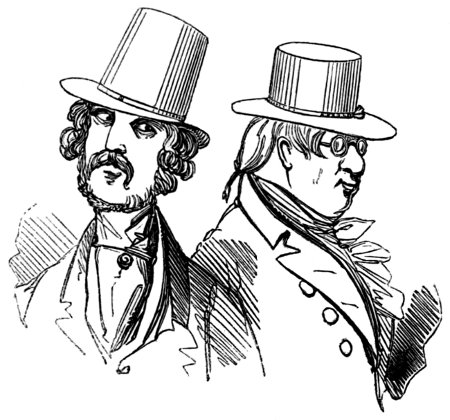
THE OLD AND NEW PRINCIPLE—BOTH WITH CREDIT.
[75] Principle, or Principal, is an old term used by our forefathers in "money matters" and commercial transactions, but is now obsolete. It formerly represented capital, and raised the British merchant in the scale of nations; but it is now a maxim of trade to discard Principle as not being consistent with Interest. It is paradoxically Capital to take care of our Interest, but it seldom requires any Principle to do so.
"The want of money is the root of all evil." Such is the new reading, according to the translation of a new sect called the Tinites. In the orthodox translation, the love of money was unfortunately rendered. To be without money is worse than being without brains—for this reason we should oppose all dangerous innovations, which in any way have a tendency to disturb the "balance of Capital." Right is not to usurp might. We are not, for the sake of Quixotic experiment, to invade the interests of the landed proprietor by an Anti-Corn Law movement, nor the vested right of doing wrong, which the various close corporations of law, physic, and trade, &c. have so long maintained, making England the envy of the world and the glory of surrounding nations.
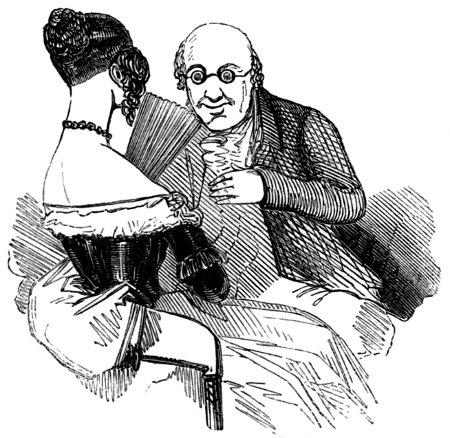
THE TIN-DER PASSION.
Interest, therefore, teaches us to interest ourselves for our own interests, and to keep them continually in view in all our transactions. When a man loses sight of his own interests he is morally blind; he must, therefore, according to this rule, walk with his eyes open, and be wide awake to every move—keep the weather-eye open, and not have one eye up the chimney and the other in [77] the pot, but both stedfastly fixed on the main chance.
Interest teaches us also to swear to anything and admit nothing; to prove, by the devil's rhetoric, that black is white and white black; to tamper, to shuffle, to misrepresent, to falsify, to scheme, to undervalue, to entangle, to evade, to delay, to humbug, and to cheat in virtue of the monied interest.
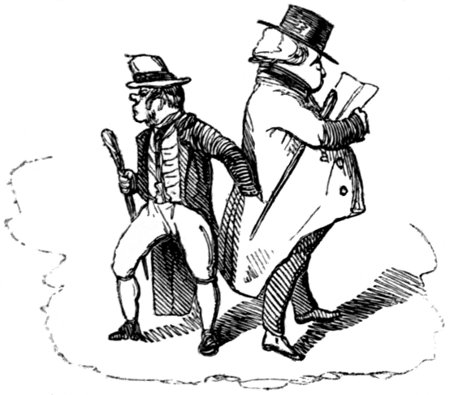
FAITH AND DUTY.
In the days of our forefathers, we had a most excellent compendium of Faith and Duty, called [78] the "Church Catechism," which taught us not only to "fear God and honour the King," but to be "true and just in all our dealings." The "fast and loose," "free and easy" system of "liberality," shuts the Creed and the Catechism out of half our schools; and worldliness teaches in its place the creed of Mammon. Instead of being taught to worship God, we are taught to worship money. Instead of honouring the Queen, we are told to bow down to the "golden image" which trade has set up; we no longer consult our conscience, but our pocket; for principle we read interest—for piety, pelf.
In illustration of this, the following "cut and dry" "'Change Catechism," which fell from the pocket of a Latitudinarian bill-broker, is subjoined, as affording the best examples of the Rule of Interest.

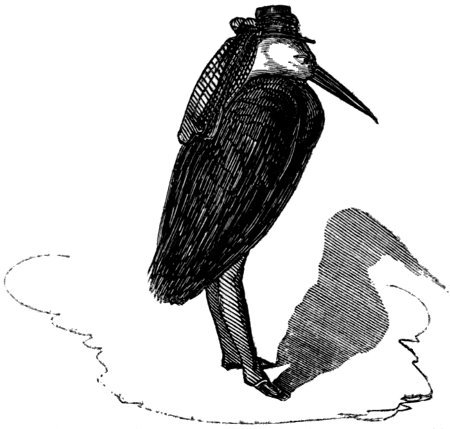
When goods are bought or work is done, a bill is to be made out and delivered. In some cases the bill may be made out before the work is done, [84] and work charged in prospective; and therefore the making out of bills is an art and mystery known only to the professional man or the tradesman. It comprehends the mystery of mystification, and impudence and assurance are its two first rules. The milkman is not only allowed by parliament to water his milk, but to cut a notch in his chalk and mark double. The baker thinks it legitimate, and part of his vested rights, to put in "dead uns;" the butcher to "hang on Jemmy;" but the birds noted for the longest bills are the carpenter woodpecker, (who undertakes to take you under) the gallipot [85] crane, the red-tape snipe, and the heron. The bills of each of these bipeds are as long as from this to the paying of the National Debt, and as unfathomable as the Bay of Biscay—or the lowest pit of——
L
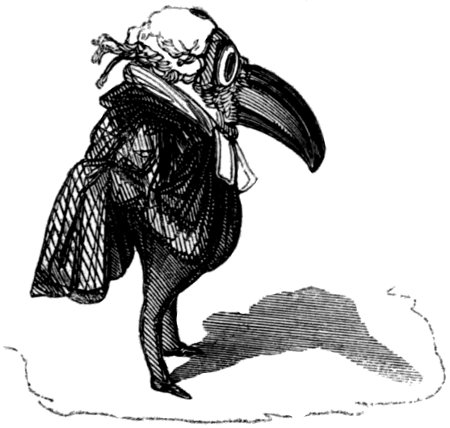
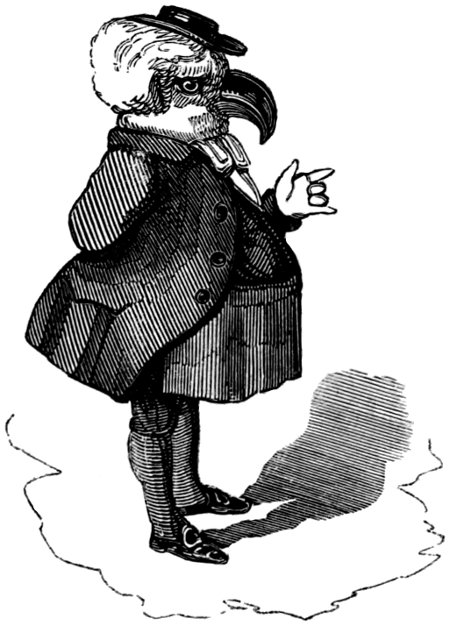

A DECIMAL FIGURE.
Decimal Fractions are so called because the fractions are always tenths. They differ from [90] Vulgar Fractions in this, that the denominator is not written, but a point before it is used instead.
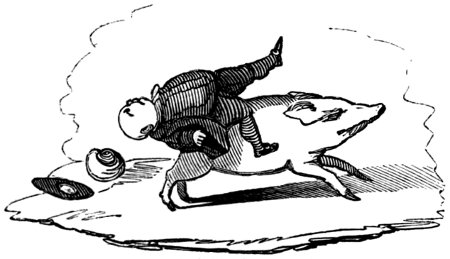
A STRONG TITHE.
Decimals are best illustrated by tithes, which are general and universal tenths extracted in every part of "merry England." They are added, subtracted, multiplied, and divided like any other numbers, but to designate their value a point is prefixed.
In tithes, as in decimals, the denominator does not appear; that is to say, the incumbent rarely lives at his incumbency. When tithes are to be added, taken, or subtracted, the tithodecimo point [91] is used as his representative, namely, the POINT OF THE BAYONET.

To make a point of "doing good by stealth" is a national virtue; and among all other "points" in this uncertain world, the "point blank" is the most certain. This may be made with a rifle, [92] when the pockets are to be rifled, either with or without a bayonet at the end of it. The charge for spiritual care is best settled by a charge of dragoons; and a discharge of clerical arrears by a discharge of fire-arms.[4]
Take a tithe-owner, a collector, a proctor's warrant, and a constable, and go in a body to the house of a Quaker, or the mud hovel of an Irish Catholic. Enter the house by means of a crow-bar. Take pigs, poultry, pots, pans, sticks, or rattletraps. Obtain an appraiser, call in a broker, and divide the spoil by means of any number of vulgar fractions, called purchasers. Take the dividend, called plunder, and "pocket."
The proper value of a decimal is only to be ascertained by his points of character, and they are to be found of full value in many parts of the kingdom, in the shape of worthy curates, and honest rectors and vicars, dividing not their flocks, or the produce of their flocks, but their own time, means, and money, in the conscientious discharge of their clerical duties.
The Rule of Practice is indispensable in all our operations. It is in some degree the "ultimatum" of the preceding rules, for as the proverb says, "Practice makes perfect."
Nature is said to have begun the creation of "living infinities" by this rule, for in the words of the poet,
Practice is thus divided into two kinds—the first called Practice Preliminary; the second is denominated Practice in General.
[95] Practice Preliminary is experimental philosophy, or asking discount for a bill at 18 months; Practice in General taking in the flats. The one resolves itself into "trying it on," the other to "clapping it on."
"Trying it on" is an universal principle, from the old Jew salesman who asks four pounds for a thread-bare coat and takes four shillings; or the old cabbage woman who offers 3lbs. of "taters" for two pence and sells 7lbs. for three farthings; to the prime minister who asks three millions of taxes, and expects five. The converse of this rule is, "Don't you wish you may get it."
Practice is performed by taking "aliquot parts;" to be a man of some "parts" is therefore necessary. The application of our "parts" to the science of L.S.D. with a view to their development and perfection, is the aim of the rule, and the "practice of Practice" is to show,
PRACTISING AT EXETER HALL.

HULLA, BOYS, HULLA.
Practising for the Army.—As shooting and slaying are the legitimate objects of this profession, [100] you cannot begin too early. The first instrument to be used is a pea-shooter; this is for the age P.C. previous to corderoys. The second is a pop-gun, indicating the age of breeches (and breaches). From this we arise to "sparrow-shooting," after the ruse de guerre of the salt-box has been tried without effect. Being now grown bloody-minded, we go to that sanguiniferous-looking house at Battersea, called the Red House, (being of a blood colour, from the enormous slaughter committed near it,) and here we take lessons in pigeon-shooting. From hence to the Shooting Gallery, Pall Mall, we improve rapidly. A lieutenancy in the Guards is our next step. To this succeeds a dispute respecting the glottis of Mademoiselle Catasquallee, and "Chalk-Farm" or "Wimbledon Common" is the result; and here, unless courage should ooze out of our fingers' ends, we may stop; our courage is apparent, and for the future we may shoot with the "long-bow" to all eternity without fear of contradiction.
Practising for the Profession.—"Cutting up" and "Cut and come again," are the maxims of the surgeon; and as no trade or profession can live [101] except by the adoption of the "cutting system," and if a man cannot cut a figure, he will assuredly be cut by his acquaintance, surely the art should be thoroughly studied. As a preliminary step, Burking and body-snatching must be mastered; and then you may go snacks in a "subject," and take your "loin of pauper," "leg of pauper," or "shoulder of beggar," or "rump of beggar," or "sirloin of alderman," or "fore-quarter of citizen," or "hand and spring" of beadle or bellman. Or should your taste be fastidious, you may take a "fillet of cherrybum;" or club for a "sucking-kid." On these practise till you are perfect; and should it so happen that any of the personages above-named should turn out to be related by consanguinity, be as stoical as a reviewer, and make no bones of cutting-up (if necessary for science) your own father.
Practising for the Ministry.—The aspirant for the "tub," "born in a garret, in a kitchen bred," commences his spiritual career by announcing to the elect that he is almost sure that he has had a call (caul), for he has heard his mother say he was born with one. He may next exhibit [102] his buffetings with Satan by showing the marks of the beast, in the shape of double-dealing, pettifogging, shuffling, cutting and cheating; he may next venture on the new birth.
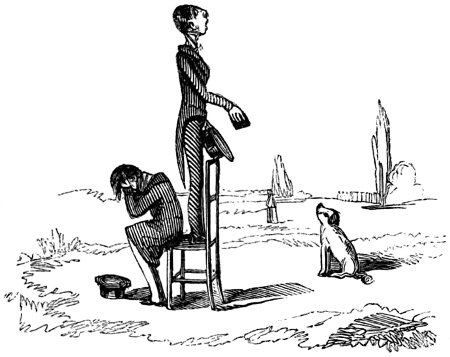
He now attempts open-air preaching on Kennington Common, and exhibits spiritual rabidity in good earnest. He foams at the mouth, barks and bites, and yells in his ravings; calls himself from a pig to a dog, and from a dog to no gentleman. What is he? "A bundle of filthy rags," "a whited sepulchre," "a cancerous sore," a "sink [103] of pollution," "a mass of corruption," "a cesspool," "a common sewer," "a worm," "a scorpion," "a snake," "a spider," "an adder." He may also charge himself with murder, abomination, witchcraft, lying, and every vice denounced in the Decalogue, on the principle of "the greater the sinner the greater the saint."
Having thus initiated himself into the spiritual fraternity, he may write a work to prove that the "Church damns more souls than she saves."[6] He then mounts the rostrum as a burning and a shining light. He deals in brimstone, wholesale, retail, and for exportation. Now he unites his spiritual with secular power, and mixes parliamentary logic with divinity, electioneering squibs with "Hymns of the Chosen;" makes Lucifer cuckold, and swears himself his true liege man on the cross-buttock of a radical candidate. He now receives the degree of D.D. from a Scotch university, for 7l. 13s. 6d., and begins to feel as "big as bull-beef;" his lank hair curls; he has red velvet cushions to his tub; he begowns and belappets [104] himself; he looks on all sides for an half-idiot heiress, or infatuated widow in a state of fatuity, and marries. Thus he jumps into his bishopric, makes religion a "good spec," till it is found out he has had "two wives" before, and a variety of miniature portraits of himself:—and thus ends his Practice.
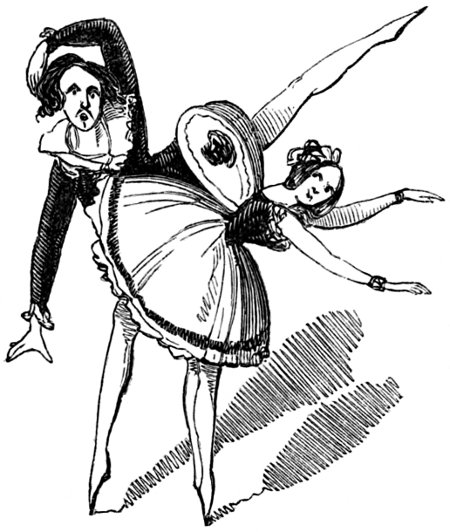
PRACTISING FOR THE OPERA.
Man is a "forgiving animal," and this is a better definition of him than Plato's "biped without feathers," which the plucked cock demonstrated. Man is the only animal which strikes a bargain. A dog does not exchange a bone with another dog; and however skilful he may be at a steak, he is not at all clever at this sort of "chop."
"Our chops are our masters," says Hobbes; and it is all "a matter of wittles," says Sam Weller. Hence arise the art and mystery of swapping, buying, and selling, and the notion of trade and commerce.
England is per se a nation of shopkeepers—we do every thing upon the principle of small profits and quick returns. To barter the national honour [106] is legitimate policy; to sell up our enemies has been a practice since the days of the Plantagenets.
Hence we can always buy our enemies, if we cannot beat them. Buonaparte, according to the radicals, was sold at Waterloo; we have been recently sold to the Russians; and thus British gold has been always more powerful than British steel.
Ten thousand thanks will be given to any influential gentleman who will procure the advertiser a place of commensurate value under government: an under lord of the treasury, a commissioner of excise, a distributor of stamps, a head clerkship, or any other situation, in which the principal duties are to receive the salary.
[107] Appointments in the army secured without risk, loss, or trouble to the purchaser. Cornetcies, Ensigncies, Lieutenancies, Colonelcies, to be disposed of, at the lowest possible prices. Also a few cast-off ribbons, stars, spurs, and garters, to be had a bargain.
The next presentation to a valuable rectory, to be had for a song. A title for orders, "cheap as dirt." Degrees may be obtained of A.M., LL.D., D.C.L. and D.D., on reasonable terms; and livings wholesale, retail, and for exportation. Apply at the "Bottle-nose Head," York; or at the "Frigasseed surplice," Canterbury.
[108] Comfortable and respectable sittings at Beelzebub Chapel, Brimstone Alley, St. Luke's, under an able minister, by the quarter, month, or year. Pews to hold eight, 2l. 12s. 6d. per annum; single sittings, 10s. The Pewseyites will have the right of election and other privileges.—N.B. No connexion with the parish church next door.
To be sold, peremptorily, the property of a gentleman about to travel, (once a rum cove, now a Sidney cove,) a five-year old hunter, the most splendid horse in Europe, with grand action. Got by Spavin out of Roarer, grandsire Glanders, grandam Botts, warranted sound and without fault; (blemishes are not faults, but misfortunes;) gentle to ride, quiet to drive, warranted to do fourteen stone, or any other weight. Price 120 guineas.—No abatement.
[109] Sale by auction, in Smithfield. Without reserve. A most eligible and desirable lot. Coming in low. Parasol, bustle, and baggage included. My better half. Weight, sixteen stone. Has taken the lead at All Max. Temper, mild (horse-radish). Eloquence, Broughamatic. Voice, Saffernhillish. Person, Nixmydollyish. Talons, cataclawdish.—No abatement.
The idea of trade and commerce naturally leads us to the consideration of the sublime science of Political Economy, which endeavours to dogmatize that profound conundrum, that the natural rate of wages is that which barely affords the labourer the means of subsistence, and of continuing the race of labourers—meaning thereby, the starvation point at which a labourer can be worked. It is assumed that the labourer has so much work in him, and the problem is to draw it out at the least possible cost—of whip or legal enactment—or police forces or military expenditure.
Another leading doctrine of the political economists is, the fatal necessity of starvation. It is maintained, and that seriously, that "God, when he made man, intended that he should be starved;" that human fecundity tends to get the start of the [110] means of subsistence; that the former moves as 2, 4, 8, 16, 32, 64; but the latter only as 1, 2, 3, 4, 5, 6, 7, 8. The consequence drawn from this proposition is, that poor-laws, or any efforts of charity, are only a childish indulgence of feeling; for since there will be a surplus number, who must at all events be starved, if the life of one is saved by charity, whether public or private, it is only that another may be starved in its stead. Hence the perishing of annual multitudes may be looked upon as a proof of the national wealth; and the poor-law system, and the Queen's Letter, but so much concern utterly useless; and the only remedy for our abundant population is for us to return to the system of the ancients, and legalize a few Herods, or, to go further back, to make every man a Saturn—the eater of his own children.
Discount is the allowance made to a person, for paying money before it is due; so says Walkinghame; but there are now few persons who commit so egregious a folly, the plan being not to pay until it has been due a long time, and then get discount as for ready money.
The usual manner of settling accounts in the City is to purchase for ready money; to give a bill at three months, which is to be considered as equal to ready money; and when the bill becomes due to give—the cash? No! but another bill at five months. This is called cash payments.
[112] Leaving the City, as being "vulgar," let us look at discount by the broad light of Universality. Discount means something "taken off," or reduced by so much, or decreased in value, or lessened.
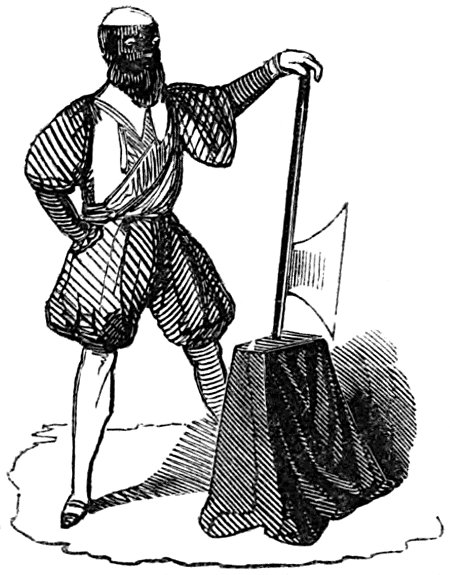
"DISCOUNTING FOR A MAN FORMERLY."
A man is said to be at a discount on 'Change, when he has no change at the Bank; when he has no banker in the City; when "no effects" is written on his "mandible:"—at Almack's, when he ceases to invite dinner eaters; among the ladies, when grey hairs and crows' feet make their appearance, and teeth their disappearance.
[113] Par, above par, below par. We are at par, when in that blessed state of equanimity found in perfection at a Quakers' meeting; above par, when floundering about in champagne; and below par, when cooling down on water gruel and Seidlitz.
Examples of discount at the present moment are too numerous to mention. Every thing seems at a discount; radicals, dissenters, theatricals, fine arts, scientificks, trade, commerce, manufactures. Asses' heads alone are looking up.
Involution and Evolution are two rules of arithmetic which signify getting in and getting out. Involution signifies such matters as getting in love, getting into a lawsuit, or getting into debt. It is the rule of entanglement, and is represented by a fly in a spider's web.
Evolution comprehends all the tricks, shifts, schemes, and stratagems, by which we get out of our various difficulties; but it may be observed that it is much easier to become involved in any matter, than to get disentangled: whatever may be our evolutions, it is a difficult matter to get out of love, out of a law-suit, or out of debt.
The ways of getting into debt are multiform. To be involved is patriotic, fashionable, genteel, and sentimental. To pay is vulgar, inconvenient, and unpopular. [117] The man who lives within his means is never considered to have any means. A man in debt possesses an interest and an importance truly pleasurable. It is surely something to know that in your little self a hundred are subject to hopes, fears, anxieties, speculations, aspirations, and a world of such like poetry. The greater the number of creditors, the greater must be the sensation produced; and the production of a sensation is every thing in fashionable society.
The old proverb was, "Out of debt out of danger;" but modern arithmetic teaches, "In debt out of danger;" the law of debtor and creditor being fashioned according to this maxim, which is now the Lex Scripta of the courts. To be over head and ears in debt, is the best security; "debt is the safest helmet." To be not worth powder and shot, or to make believe you are not, is the best method of keeping on the wing. It requires, however, some curious evolutions to enable an empty sack to stand upright.
This is an involuntary process, and an entanglement equally powerful with the meshes of [118] the law. In this case, however, the pleasure increases with the entanglement, as the fly said in the honey-pot. The arms of a fair lady are the softest bonds; the poison of a maiden's lip the sweetest poison. To be in love is to be entangled in a cobweb of ten thousand ecstasies, where every string is bliss, and every mesh is beauty. In this web, Cupid sits as an angel in one corner, and Hymen on the other; thus bound with sighs, tied with kisses, linked by embraces, chained by tears, lovers disport themselves; till Hymen, in fear that they should die of ecstasy, tightens the web, and binds them hand and foot in the true lover's knot of matrimony.
| Rule 1. | Make up your mind to "go the whole hog" with your party. |
| 2. | Flatter, gammon, and gloze all parties. |
| 3. | Humbug your opponents, and cheat your supporters. |
| 4. | Make love to every prevailing vagary of the day, and coquet with Mother Church, and her fantastical daughter, Miss Dissent. |
| [119]5. | Promise every thing, perform nothing, and be the last year of your parliamentary term a contradiction of the six preceding years, so as to ensure another return. |
Supposing yourself to be a green yokel, just raw from school, with little wit, little money, and little influence, act as follows:—
1. Marry for the sake of respectability and a little more money.
2. Give away soup to the poor, flannel petticoats, trusses, and baby linen.
3. Set up schools on the free system, "every boy his own archbishop:" Free-trade in religion, and no walloping.
4. Get into a squabble with your Rector, about free grace and non-election.
5. Write once a week in the dissenters' "slop pail," against clerical intolerance, tithe pigs, "red noses," round paunches, lawn sleeves.[120]
6. Attend the jawy jobations of Exeter hall, as a "flowery speaker," and advocate various Jew, Gipsy, Voluntary Church, Anti-pseudo-baptistical Societies, till you are black in the face.
7. Join the Society for the Diffusion of Useless Knowledge, the Donkey Protecting Society, and other congenial "Institutes."
8. Build a chapel, and bribe a congregation to come to it. Become a teetotaller; be a betwixt and betweenish, half-and-half, out-and-out radical. Defeat the imposition of a Church rate—rave against the taxes—pledge yourself to support triangular parliaments, universal suffering—blindfold voting—and confusion to all order.

MEASURING BY THE "YARD"—TRUE FIT.
Duodecimals teach us to find the superficial contents of any "thing." A thing is properly [123] something, neither woman nor man; possessing all the superficial of either, and the substantials of neither: such as numbsculls, lordlings, quacks, empirics, &c.
Duodecimals also teach the mensuration of plastering, painting and glazing; which comprehend the arts of palaver and gammon, and the science of Flattery in general.
This is, above all others, a "superficial age," and the mensuration of superficies is characteristic of the modern era—the age of meretricious flummery. Our science is superficial thinking; our morality, superficial blinking. Every thing is made now-a-days for the "surface," which, like the gilded wooden organ pipes, placed in front of that instrument, are not made to blow, but for the sake of show. In learning, we get a smattering instead of the real thing; and we drop the meat for the sake of the shadow. The deep and the solid have long ago been discarded: in short, this is the age of gammon, and society is like a quire of "outsides foolscap."
Of Flat Surfaces.—A plane or flat surface has length and breadth without thickness. Flat [124] surfaces are often made, by some peculiar property of polarized light, to reflect rays which do not belong to them. Thus, flats pass for solids, and "shallows" for "deep-uns."
Book-keeping is not to be understood only as the art of "Book-borrowing," a very good science in its way, but as the highest branch of the science of legerdemain, invented for the express purpose of enabling the speculative to conceal their accounts, just as the use of speech is given to man to enable him to conceal his thoughts.
We have excellent directions given us on this head from very high authority, which is to be understood according to the Benthamite Philosophy. "How much owest thou my lord? And he said, A hundred measures of oil. Take thy bill, and sit down quickly, and write fifty." Hence the children of the philosophers are wiser than the children of light.
In "keeping books" it is not only indispensable that you should keep them, but that they also should "keep you." This is in accordance with [126] the free-trade reciprocity system; and to enable them to do it requires but little tact. For instance, you open a shop—not for the purpose of doing business, but for doing some unfortunate flat, in the very spirit of a "Good-will;" so that when your business is done, your client may find his business done too, and when you have taken yourself off, he may find himself taken in. This example may be repeated any number of times.
Upon entering life, every young man must consider that it will be quite impossible to live without some "cash in hand;"—that he will, at times, be inevitably called upon to "fork out," "dub up," or "come down;"—and that in all transactions, such as swelling and dashing, cutting and flashing, it will be necessary to keep a sharp look-out upon the "blunt," tin, or pewter, as it is variously termed; if not for your own satisfaction, at least for your beloved father's, whom you are in duty bound to bamboozle. There are certain items which never need come into this account; namely, board, lodging, tailor's bills, boots, shoes, linen, horses, and such like necessaries; these belong religiously to the old boy, or are fit and proper matters for "whitewashing."
[127] To fulfil this purpose, open a cash account, putting Dr. in the left hand corner, which signifies Dear Father, in honour of your respected parent, or in testimony that everything is dear; and Cr. on the right hand, which may signify "cruel little I have to spend." This is called the Waste Book. The items introduced are merely hints for the getting and disbursement of Cash.
| Simon Sapscull Clutchings, in Account with his Father, from May 1 To May 3. | |||||||
| Dr. | Cr. | ||||||
| £ | s. | d. | £ | s. | d. | ||
| May 1. | May 1. | ||||||
| Out of the old chap, by wheedling and bullying | 50 | 0 | 0 | Paid at Shooting Gallery, and at the Fives' Court | 4 | 16 | 0 |
| Out of the schoolmaster, after being in Whitecross-street two hours | 0 | 3 | 8 | For cigars, riding whip, Sporting Calendar, and Life in London | 2 | 10 | 0 |
| Out of mother, by way of bonus on "good nature." | 10 | 0 | 0 | For salve for the dog's tail, (burnt some time since) | 1 | 10 | 0 |
| [130]Out of father, for charitable purposes | 20 | 0 | 0 | Spent at Divan, Coal Hole, and at various places on stroll | 3 | 0 | 0 |
| Out of sister, to lend a friend in distress | 20 | 0 | 0 | For Covent Garden Oyster Rooms, cigars, brandy, champagne, and various other matters indistinctly remembered | 20 | 0 | 0 |
| Out of mother, another 20l.—having lost the first when carried home drowned, (good idea this,) Mem. to be repeated. | 20 | 0 | 0 | Relief to a poor young widow, soda water, and restorative cordial to the dog | 5 | 0 | 0 |
| Paid Duncombe for books, according to father's direction; Flash Lexicon, ditto Songster, ditto Anecdotes, ditto Morality, ditto Divinity | 4 | 0 | 0 | ||||
| May 2. | [131]May 2. | ||||||
| Out of father, for divinity books, (sorry didn't get more, as the old chap is so pleased to think I am "preserved") | 40 | 0 | 0 | Paid at Westminster pit, and loss on dog Billy | 10 | 0 | 0 |
| Cigars and coachman, for a turn with the ribbands | 3 | 0 | 0 | ||||
| Turn out in post, breaking horses' knees, paid horsekeeper | 15 | 0 | 0 | ||||
| Cigars, sandwich, heavy wet, negus, brandy, brandy-and-water, Welsh-rabbit, port, sherry, waiters | 5 | 0 | 0 | ||||
| At the Lowther—gloves, pumps, supper, bursting waiter's tights, breaking glasses, negus, wine, supper, brandy, soda water, brandy, wine, whisky, brandy, claret | 10 | 0 | 0 | ||||
| Tearing ladies' dress, spoiling gentleman's watch, damaging ladies' false teeth, smashing fiddle, &c. | 26 | 0 | 0 | ||||
| To a destitute mantua-maker | 3 | 0 | 0 | ||||
| Worm pills for the dog | 1 | 10 | 0 | ||||
| [132]May 3. | May 3. | ||||||
| Out of mother, to invest on the sly in the 3½ per cents. for herself | 40 | 0 | 0 | To soda water and brandy, brandy solus, Seidlitz, vinegar and water, cab to Park, ditto to Colonnade | 1 | 15 | 0 |
| Borrowed of Jem | 3 | 0 | 0 | [133]To rouge et noir, bagatelle, breaking cue, and losses on learning French and Hebrew | 50 | 10 | 9 |
| Balance due to me | 56 | 3 | 0 | To "Drury"—cigars, saloon, cab, brandy, Falstaff Drawing Room, music, oysters, champagne, brandy, damaging lady's bonnet, ditto gentleman's glass eye, ditto whiskers, ditto lady's curls, ditto curtains, ditto windows, ditto policeman's nose | 76 | 14 | 10 |
| Relief to a poor servant girl out of place | 1 | 0 | 0 | ||||
| To Mrs. H. for her motherly care for next three days | 15 | 0 | 0 | ||||
| To the pew-opener at church on Sunday | 0 | 0 | 1 | ||||
| £259 | 6 | 8 | £259 | 6 | 8 | ||
[134] Having been thus initiated in the making out of personal accounts, the pupil must now turn his attention to the methods of Book-keeping adopted by "gentlemen in difficulties," connected with that peculiar process of law which professes to put new wind into a collapsed bladder, and enable an empty sack to stand upright. The example is called taking the "Benefit;" the principal part of which is making out a Schedule, which may be done as follows:—
| £ | s. | d. | ||
| Paid for | twinkling a bed-post | 1 | 5 | 0 |
| Spouting the tea-kettle | 1 | 15 | 0 | |
| New teething the hair comb | 1 | 10 | 0 | |
| Stopping holes in cullender | 1 | 5 | 6 | |
| Pulling the gray hairs from hearth broom | 0 | 15 | 0 | |
| Whitewashing inside of chimney | 1 | 15 | 0 | |
| A Newgate-Calendar-novel, to soften hard-hearted cabbages before boiling | 1 | 11 | 6 | |
| [135] | Pectoral lozenges for short-winded bellows | 0 | 8 | 6 |
| 1000 cigars, to smoke for cure of corns | 12 | 10 | 0 | |
| Pigeons'-milk on the 1st of April | 0 | 10 | 0 | |
| A leather saw | 0 | 10 | 0 | |
| A worsted hatchet | 0 | 10 | 0 | |
| New vamping and welting India-rubber conscience | 5 | 5 | 0 | |
| Loan to Thimble-Rig, Esq. | 15 | 0 | 0 | |
| Ditto to Billy Blackleg | 20 | 0 | 0 | |
| Ditto to Richard Roe | 25 | 0 | 0 | |
| Ditto to John Doe | 25 | 0 | 0 | |
| Ditto to Jack Noakes | 40 | 0 | 0 | |
| Ditto to Tom Styles[7] | 60 | 0 | 0 | |
| £204 | 10 | 6 | ||
Notwithstanding the copious examples above given, there is one other kind of Book-keeping which can only be thoroughly understood by the first accountants, and is only practised by the first of practitioners. This is making up a book for the St. Leger, which is
LEGERDEMAIN COMPLETE.
| [136]An Account of the Expenditure of the "Secret Service Money," from 1825 to 1841. | |||||
| £ | s. | d. | |||
| Paid | to Colonel Queerum, for a series of Tricknometrical admeasurements of the length and breadth of public credulity | 1,000 | 0 | 0 | |
| To Captain Audacity, for endeavouring to determine the "heights" of "impudence" in Whig Radicalism | 1,000 | 0 | 0 | ||
| To Colonel Feel-your-way, for surveying the Terra Incognita of ways and means, per session | 1,500 | 0 | 0 | ||
| To Dr. Sapscull, for instructions in sapping and mining the constitution | 2,000 | 0 | 0 | ||
| To Dr. Gammon, for moonlight lessons in the art of Mystification and Jack-o'-Lanternism | 500 | 0 | 0 | ||
| To Dr. Lardner, for horizontal sections of the broadest latitude of latitudinarian policy | 1,000 | 0 | 0 | ||
| To Lord Bumfiddle, for a series of impracticable experiments in the House of Lords | 5,000 | 0 | 0 | ||
| [137]To Lord Bumfiddle, for his project to light both houses with "cats' eyes," to facilitate legislation in the dark | 2,000 | 0 | 0 | ||
| To expenses of a tour to the Devil's Ace-à-Peak, to discover the polarity of political consistency | 3,000 | 0 | 0 | ||
| To Dr. Bubblejock, for a new plan of making long speeches out of soap bubbles | 1,000 | 0 | 0 | ||
| To Jack Pudding, for the sale of nostrums, "pitch plasters," and hocusses | 2,500 | 0 | 0 | ||
| To Döbler, for instructions in legerdemain, sleight of hand, and hocus pocus | 1,000 | 0 | 0 | ||
| To J. H. for his chemical extraction of the blunderful from the public accounts | 1,500 | 0 | 0 | ||
| To a cargo of soap and soft sawder, to unite the dissenters | 500 | 0 | 0 | ||
| To various sops thrown to the Irish hound "Cerberus," on going into the Tartarus of a new session | 17,000 | 0 | 0 | ||
| To Mesmerizing a Whig Lord, at stated intervals, and for dust to throw into the eyes of the Church | 3,000 | 0 | 0 | ||
| To Oliver Hill, for his plan of buying and selling, and living by the loss | 100 | 0 | 0 | ||
| [138]To Pawnbroker's interest on pawning the crown and keeping the Queen in check | 5,000 | 0 | 0 | ||
| To pepper, mustard, Congreve rockets, and Spanish flies, for seasoning speeches at public meetings | 2,000 | 0 | 0 | ||
| To 150 yards of new spouting for Exeter Hall, and for the repair of weathercocks at St. Stephen's | 1,000 | 0 | 0 | ||
| For putting a new bottom to the fundamental maxims of English law, (paid by Sheriffs) | 5,000 | 0 | 0 | ||
| To a constant supply of "hot water" for both Houses, and for the use of "cold water" to throw on petitions | 5,000 | 0 | 0 | ||
| To Dr. Shuttlecock Casey, for his plan of "water grueling" the poor, and "blowing up" schoolmasters with "small beer" science | 0 | 0 | 0 | ¼ | |
| To "Hogs' Wittles," of various kinds, in the shape of pamphlets, addressed to the swinish multitude | 3,000 | 0 | 0 | ||
| To Daniel O'Connell, for pulling the wires of the political Punch and Judy, seven sessions | 150,000 | 0 | 0 | ||
| [139]To Scott the diver, for going to the bottom of the Exchequer bills affair, and reporting unsound | 1,000 | 0 | 0 | ||
| To Colonel Common Sense, for blowing up the wreck of the "Impracticable," and reporting "safe anchorage" (unpaid) | 0 | 0 | 0 | ||
| £215,600 | 0 | 0 | ¼ | ||

CHARLES I.—A BLOCK-HEAD.
We have already treated on "superficial measurement;" we now come to "Solid Measure." Solids are, in general, what are termed "blockheads," [141] or "thickheads," or "bumbleheads," or "numbsculls," exemplified in "senior wranglers," "tripos," "professors of Greek," and teachers of Latin. The advantages of a thick scull are great. It was found upon the gauging of Porson's head, by the heads of his college, that his scull was so thick that it became the subject of marvel how knowledge could get in—once in, it was held impossible to get out. The case is the same with most of our schoolmen.
Solid Measure has been applied with great success to the measure of blockheads by Messrs. Gull and Spuzzy, Epps, Ham and Co. The measure is now principally performed by a Scotch "Combe," consisting of four "bushel-heads" in one. This instrument, the length and breadth and thickness of a head being given, will work out the solid contents and capacity of the understanding, to the fraction of a fraction.
The science so formed upon the measure of wooden heads was invented by Albertus Magnus, who flourished in the thirteenth century and made a wooden man with a wooden head, dividing it into [142] sixty-eight orders or ratios. Gull and Spuzzy, however, finding this large number bother them, took away thirty-three, sans cérémonie, observing, "Organum botheratio sive ambarum rationum mistura fortuita effervescens, bullas gignens." But the whole scull is now mapped out into thirty-six compartments, and subjected to a trigonometrical survey, and a barometrical admeasurement of comparative heights and hollows.
These divisions are so delightfully situated, that from Combativeness, the organ of fighting, we enter Friendship, (Adhesiveness,) without a turnpike between. Acquisitiveness, the love of money, is next-door neighbour to Ideality, the quality of poets, who generally show so much contempt for it. Constructiveness, the organ of building, lies as a foundation for that of Music, and handy for the grating of saws, the knocking of hammers, and the squeaking of wheelbarrows, as accompaniments to Haydn's symphonies. Metaphysics are also handy for wit. Ideality is a parallelopiped, Hope is a square, Cautiousness a circle, Eventuality a semicircle; then we have cones, rhomboids, trapeziums, polygons, hexagons, decagons; [143] while Language, like the science itself, is all my eye.[8]
Thick-heads, block-heads, bumble-heads, or basket-heads, which used in former days to be symbols of obesity, and gave rise to the maxim, "Great head, little wit," are now the indications of intellectual superiority. "The bigger the head the greater the genius," as the mushroom said to the cucumber; and to have a head as big as a baker's basket, or the bustle of a lady mayoress, is perfection.
To fumble these heads is the business of the Feelosophers; so called from feel, to fumble, os, a bone, and pher, far from the truth. This science being at our fingers' ends, a great advantage is felt in all the transactions of life, as the most tender ideas maybe expressed with mathematical certainty, numerically, figuratively, and arithmetically, as follows:—
Divine Louisa,
I need not remind you that last night I felt (not emotions, raptures, and soul-thrilling transports) but your BUMPS. On returning home I also felt my own, and I hasten to inform you that while 17 is throbbing like an earthquake, all my 33 is insufficient to describe my state, on finding that a kind Providence has ordained that for every bump on your beloved head, there rises a corresponding bump on mine. I 18 you do not see them, and in 16 declare that my No. 11 only centres in you.
I do not wish to give a false 26 to what I say, but in the 30 of your becoming mine, my No. 1 will develop No. 2, and all my No. 3 will be directed to 14 for your 13. Dearest girl, need I say more? Nos. 2, 3, 4, are so harmoniously protuberant in both of us, that I can have no doubt of either a large or a happy home. Your 23 and 24, and the 26 on your [145] cheeks, are indeed divine. Sweet soul, do allow your 13 to name as soon as possible your 31 and 27, that no untoward 30's may cross our 17's.
Yours, from 1 to 36,
Bobby Bumpas.
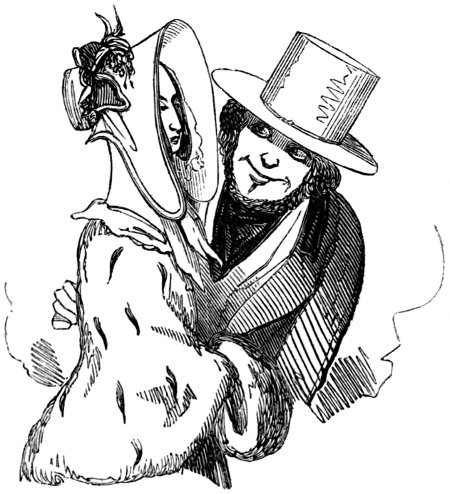
"ASSURANCE."
Assurance or Brass is a rule of the utmost consequence in all monetary transactions; by it miracles have been performed from the earliest ages. A good stock of assurance, i. e. impudence, [147] will carry a man further than even a stock of money, wit, or learning. The brazen head of Friar Bacon, by which he is said to have performed such wonders, was nothing more than a typical personification of the brass, assurance, or impudence of the conjuror. The present prima facie economic method is to wear a brazen face with a wooden head. Mettle, it is true, may be necessary, but "cheek" is indispensable.
Modesty is an antiquated virtue, to be repudiated above all others; and humility is only fit for charity-school boys, who learn the "catechiz." But even among these the notion of "humbly, lowly and reverendly," will soon be exploded by the music and dancing system; the new philosophy of the times being, "Jack's as good as his master" and a "tarnation sight better;" every one feels this assurance.
Be assured, gentle readers, there is nothing like brass; it enables a man to put his best leg forward, and a good face upon any thing. Brass is the true philosopher's stone, which turns all it touches into tin. By it the insignificant makes himself important, the empiric becomes a professor, the smatterer a proficient, the mountebank a philosopher, [148] and the quack an oracle; in short, by this rule, "fools rush in where angels fear to tread."
The rule of Assurance is founded upon the fact, that there are no bounds to human credulity; well sustained assumption, with a very small amount of gumption, being alone requisite for miracles in commerce, trade, politics, or religion.
1. Calling on a friend in cold weather, make bold to "roast the boiling piece," by placing your fundamental basis before his parlour fire; lean your back against his "marble," scrape your shoes on his fender, and puff your cigar to the detriment of his elaborate ornaments and gimcracks; as to his wife and children being excluded from the fire, let that be "a part of your religion," fieri facias.
2. Should you be invited to dinner, when you enter the house, walk at once into the dining-room, and make yourself at home by pulling off your boots, calling for a clean pair of shoes, a newspaper, [149] a cigar, and the arm chair; you may nod to the mistress of the house, and say "How do" to the juveniles, if you do not wish to be taken for a brute.
3. Should you call at the house of a friend, during his absence, do not hesitate to mount his best horse, and take a twenty miles' ride for the sake of exercise. When you return, you can "stop dinner" with his wife, and afterwards take her to the Opera.
4. On entering a country church, always patronise the clergyman's or the squire's pew; should any ladies be present, you may take out your eyeglass and quizz them with a vacant stare,—they will probably suppose you to be an unknown friend;—politely hand the fair devotees the prayer and hymn-book; you may also hum the bass in chords to the ladies' treble; when you depart, be sure to make a very low congee, as it will mark you for a gentleman.
5. Should you, by any chance, be introduced to a new acquaintance, you may, at the expiration of a week, jerrymediddle him by the question—"You [150] have not got such a thing as five pounds about you, have you?" A person, who prefers your society to solitude, can have no objection to a loan; you can then make yourself as scarce as asparagus at Christmas.
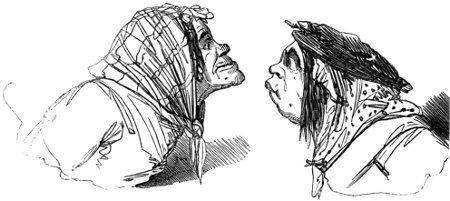
MUTUAL ASSURANCE.
Assurance is displayed to perfection in modern Assurance Companies; and it only requires assurance to raise a company as baseless as the emasculated minus of No. I., and as fabrickless as a "footless stocking without a leg," which shall be eagerly taken by the public.
The following Prospectus, lately issued by a company in West Middlesex, will afford an example:—
To the Public.—West Middlesex. The Visionary Assurance Company and Utopian Insurance, for the beneficial investment of capital, the insurance of lives, and the manufacture of diamonds out of condensed soap bubbles.
DIRECTORS.
AUDITORS.
SOLICITORS.
SECRETARY.
[153] Royal Flesh and Bones Joint Stock Matrimonial Assurance Company. Patron, Sir Peter Laurie.
The universal Uxorian, Matchmaking and Matchbreaking Company, for the equal and uniform benefit of Maids, Damsels, Wives and Widows.
Schedule A.—
Young Maids with face and fortune, 100; with face without fortune, 900; with fortune without face, 500; with neither face nor fortune, 1,000; damsels ditto, ditto, ditto, ditto, ditto.
Widows with youth and money, 100; with youth and no money, 800; with money and no youth, 600; with neither youth nor money, 1,000.
Old Maids, monied, 100; moneyless, 700; fidgety, with money, 700; fidgety, without money, 1,000.
Young Men with whiskers, mustachoes, money, and connexion, 100; young men with money and connexion, but without whiskers, &c. 800; young men with whiskers, &c., but without money, 1,000; young men without money or whiskers, 600.
Bachelors with rheumatism and money, 500; without rheumatism and with money, 100; without money and with rheumatism, 700; with neither rheumatism nor money, 1,200.
Widowers with families and money, 500; with money and without families, 100; with families and without money, 800; with neither families nor money, 1,100.
Old Men, also Old Women, 500 requiring nurses; 500 not requiring nurses; 500 old men-women requiring nurses; bed-ridden, 1,000.
[155] It is proposed to form the company of the above "Live Stock," the members of which are each to possess a share in each other. The young maids' class, No. 1, beauty, rank, and fortune, being the highest prizes—there are supposed to be a hundred of such prizes. The second class of prizes is rich old widows, with short lives, of which there are also a hundred. The third class of prizes is rich old maids, of which there are also a hundred. The fourth class comprehends beauty and intelligence; the fifth, beauty only; and so on in a sliding scale, but all prizes.
The male stock also comprehends a reciprocity system of prizes:—1st class, of the whiskered; 2d, no whiskered; 3d, monied and whiskered; and so on to widowers, with or without families, down to that least of all valuable of the genus homo, old men-women.
Each subscriber of a pound annually to have one ticket, which shall entitle him to draw for each of the prizes on the 1st of April in every year, at Exeter Hall, under a commission selected from the "Lumber Troop."
[156] The parties so fortunate as to draw a prize will have an introduction to the subject of it, and a match will be negotiated, if possible, without delay. Should the parties not suit each other, they will, upon the payment of another guinea, be privileged to draw again. But it is assumed, from a careful examination of matrimonial statistics drawn up by Dr. Lardner, that the matter of suitability will never be taken into consideration.
To facilitate its objects, a Normal seminary will be attached to the society, and a registrar engaged to marry at a reduced price, "that is, by the score."
Billy Blowmetight, Secretary.
The monetary system of England is the ideal philosophy of political economists, who, in the conviction that "nothing exists," think it no "matter" to found a variety of hypotheses to give tangibility to the intangible, substance to accident, and reality to the abstract; in short, to personify "nothing."
These intangible tangibilities bear various names, such as Consols, Bank Stock, Indian Stock, Long Annuities, Exchequer Bills, &c. The aggregate of these 0 0 0 0 0 noughts are, by a peculiar process of national arithmetic, made to amount to Stock or Funds.
[158] Stocks or Funds are the true substantials. In the golden ages of the world, cattle, corn, and merchandise were the medium of exchange among nations; but as men grew more enlightened, they agreed to represent these things by pieces of conventional metal. This at last becoming scarce, the world would have fallen into a state of hapless and irrecoverable ruin, but for the idea of a fictitious representation of a representation, of a non-existent which might have been.
Funds are therefore the to kalon, the absolute, the logos, the never-to-be-apprehended, the inscrutable, the supreme totality of "emptiness," the absolute cause, the absolute effect, the absolute concurrence of national faith; in short, the commercial "ideal" which all men worship, in its temples of the Bank and Stock Exchange.
Stocks are the "heaven of this religion," an agreeable hallucination, by which a variety of insane persons, called Stockholders or Fundholders, are permitted to roam at large under the conviction that they possess wealth. The public are compelled to believe in these fictitious representations, which are the foundation of the "imaginative system" in fiscal affairs, of the Bill and Credit [159] system in commerce, and of the National Debt.
In England there is nothing truly national but this debt, or dead weight, which is the mighty pendulum which makes the national clock "go upon tick." It is the true foundation of political economy and of social faith or trust; "'pon tick" is the basis of the wealth and happiness of our country, which it makes the envy of the world and the glory of surrounding nations.
To be in debt argues credit, and credit respectability, and respectability means, and means resolve themselves into the Funds; here they merge into the blessed obscurity of "nothingness," and being absorbed by the same media, pass for a "something" which is far more formidable than "anything." Thus private wealth moves in a circle continually, making the round O from 0 (nothing) to 0 (nothing.)
Joint Stock.—Joint Stock Companies are so called from the projectors being generally "black legs," and their victims "raw Jemmies." The object of such companies is to give honesty the [160] "cross buttock," to have a "shind eye" with capital, and to end in an "offal" bankruptcy.
From a consideration of the immediately preceding rules, and assuming as a fact the spiritual and ethereal nature of stock or capital, it is therefore proposed to found a Joint-Stock Company of unlimited capital, to be called the Boreal Pneumatic Joint-Stock Company, for "raising the wind," and making "darkness visible," or the National "Puff" Company.
Raising the wind has been the great problem of all financial operations. It is of far more importance than "raising the dead." The "wind" is a conventional term for the "needful." It is called wind because it is raised by various "Puffs."
There are various kinds of Puff; the Puff National, the Puff Medical, the Puff Legal, the Puff Literary, the "Puff Theatrical," and the Puff Scholastic.
My Lords and Gentlemen,—The flourishing state of my empire having filled me with the most intense satisfaction, I have called you together to [161] inform you that we are the envy of the world and glory of surrounding nations, and that everything is so plentiful that pigs run about the streets ready roasted, with carving knives and forks stuck in their backs, crying, "Eat me, eat me!"
I continue to receive from foreign powers the most friendly intercourse, and an assurance that they have unanimously agreed to sink their own national interests in a regard for my welfare; and in this I am certain there is no "gammon."
The Commercial and Mercantile interests are in such a state of convalescent perfection, and gold is so plentiful, that I have ordered a commission to consider of the propriety of paving with it the various thoroughfares of the metropolis, in lieu of Blockheads.
Owing to a great improvement in Benevolent affairs, it is with pleasure I have to inform you that the Public Societies have given up their vested rights, dues, peculations, and pickings, for the benefit of the poor, (should there be any such,) and will henceforth "preach without Profit."
Owing also to the general distribution of wealth among all classes, I have been enabled to divest [162] physic of its fees, and law of its charges; and both these professions will for henceforth be conducted "free gratis" and "for nothing."
Gentlemen of the House of Commons,—Through the practice of the most rigid economy in every branch of my establishment, I have directed to be laid before you an account of the sums paid into the Exchequer, being the surplus of my revenue; and I have further to inform you that taxation being no longer necessary, the expense of a house of commons may be dispensed with, and the large sums usually paid in "bribery at elections," I trust will be left to fructify in the pockets of the members.
This constitutional determination on my part, for the benefit of my people, has arisen from my being called, by Divine Providence, to a sense of my true estate of a State pauper, which has led me to reduce my dietary and that of my household to that of the Poor-Law Unions, and to introduce teatotality into every department; and I have great gratification in being able to announce, that as I have now lost "having a shadow" to my royal personality, I may myself be shortly expected [163] to evaporize, and the expense of a monarchy may be saved for the future.
My Lords and Gentlemen,—With and by the advice of my Privy Council, I have determined upon putting into execution the hydrostatic paradox, or cold water cure, in and upon that part of my dominions called Ireland; and a commission consisting of the Lords Spiritual and Temporal has been issued for laying that "flower of the earth and gem of the sea" "under water" for the space of one month, as the best method of extinguishing the torch of discord, the fire of malevolence, and the smoke of sedition, and of allaying all ferment upon Atlantic if not upon pacific principles.
I rely confidently upon the wisdom of my Parliament to enable me to carry out my beneficent intentions of subjecting all my people to "live upon air," as the symbol of true freedom, and as the most liberal and inexpensive method of obviating the evils which have hitherto surrounded my throne and government; and I would submit to your serious consideration the expediency of establishing a training school at Exeter Hall, for teaching wind instruments to all my subjects, and [164] for the arrangement of airs corresponding to the various meals, feasts, and dishes of every day life; and I indulge the anticipation that the substitution of oxygen for oxen, and gas for Gastronomy, will be conducive to the health, wealth, and prosperity of my empire.
UNIVERSAL
School-Master's Manufacturing Company,
AND NORMAL SCHOOL.
CAPITAL—SPEC.
PATRON.
His Royal Highness Hoke Poke Whangee Fum.
King of the Cannibal Islands.
PRESIDENT.
Samuel Slick, Esq. of Slickville.
VICE-PRESIDENTS.
COMMITTEE.
This Company is established in consequence of the lamented deficiency in the scholastic profession; [166] and its object is to manufacture schoolmasters of a very superior character, at a cheap rate, from various "refuse" articles of all trades and professions—technically, the "unfit" or good-for-nothing.
In consequence of a profound investigation of the science of education, it has been discovered that those who are unable to conduct any other business, are the best adapted to "teach the young idea how to shoot;" and therefore cast-off cobblers, tailors, teachers, and drapers, shop-boys and errand-boys, will be received into the establishment at the rate of a guinea a-week; where, by the aid of educational galvanism, their misdirected faculties will be sublimed, their ideas topsiturvied, their moral and intellectual nature turned inside out, their understandings new vamped, soled, and welted, and their minds infused with a succedaneum of intellectual electricity, which shall evaporate itself in the mixed mathematics, pedagogicks, whackbackics, pancakeatics, tickletobyatics, and all other scholastic sciences.
Candidates must bring personal recommendations, of a squint, a slouch, a leer, a game leg, a hump back, or any other accomplishments. Should [167] they be unfortunately destitute of these, they may produce testimonials of fitness from their washerwomen; but those who do not indulge in the luxury of a clean shirt may be recommended by the teacher of any Social sect to which they may belong. These certificates must certify them to be bumble headed, addle-pated, numbsculled, good for nothing else; that they wear dickeys and are donkeys.
Upon entering the Institution the seminants will be forced to forget everything they ever knew, by a machine invented by Mr. Combe for "Razing out the errors of the brain," and which has been used with the happiest effects at the Glasgow Normal Establishment.—A perfect Tabla Rasa being thus produced in vacuo, on Locke's principle, the professors will commence teaching their pupils to know a great A from a bull's foot, how many beans make five, and other branches of the pure mathematics.
As all the seminants will be naturals, Natural Philosophy will be a principal object of study, and the mechanical system of Dr. Lardner will be the text-book. History will be imparted through the renowned histories of "Jack the Giant Killer," [168] "Jack and the Bean Stalk," "The Ogre and his Seven-leagued Boots," and the "Newgate Calendar," under the superintendence of John Ketch, Esq.; Morality and Esthenics through the medium of "Ovid's Art of Love," "Basia," and "Little's Poems;" while the Principles of Science will be imparted through the "Boxiana," by Professor Cribb, assisted by the celebrated Scotch terrier, "Fudge."
Religion being in the highest degree essential, it cannot be dispensed with without endangering the safety of the Company. But as there are so many different sects of religionists, and so many differences in the sects, it is proposed to teach religion by machinery, on the comprehensive accommodation principle of expediency, by means of one of Cobbett's cast-iron Independent parsons, which, being constructed upon the profoundest principles of neutrality, will satisfy all parties, by teaching every religion at the same time, and none in particular: thus Atheism and Methodism may shake hands together, Mahommedanism and Calvinism embrace, and Buddhism and every other schism kiss each other in the true spirit of Christian liberality and equality.
[169] Degrees will be granted to those pupils who may distinguish themselves in flagellation, or a dexterous use of the cat or tawse, or by proficiency in the evolutions of cane, strap, or ruler; the degree of P.W., Professed Walloper, being equal to that of A.M.
(Signed)
The Right Rev. Rob. Tailor,
The Right Hon. P. Cleave,
The Very Rev. Rob. Carlisle,
Simon Squeers,
Secretary.
We are requested to announce that the new Novel, called the "Bloody-minded Costermonger, or the Donkey's Apotheosis," having experienced a sale unprecedented in the annals of Literature, a new edition is in preparation, worked [170] by steam apparatus, to supply the astounding demand, and will be issued on Saturday next.
"This extraordinary work is creating a sensation the most intense, as it completely daguerreotypes nature, penetrates the feelings like the electric shock, macadamises the heart, and cuts the soul to shivers."—The Censor.
New Novel by "Snivie." Written seven months after his decease, by the aid of the galvanic apparatus.—It having come to the ears of an experimental philosopher, La Fontaine, that this great author was no more, and it being justly surmised that a very large amount of Novel matter must remain in his system, La Fontaine undertook the task of extracting it by means of the mesmeric process, and has succeeded with wonderful effect. In performing his numerous experiments the flashes of wit were so intense as to overpower the anxious publisher, who, in the intensity of his admiration, has paid so large a sum for the copyright as to be enabled to add to the character of the work by charging double.
It is with the most astounding rapture that the Manager of the Theatre Royal, Drury Lane, has to announce that the new tragedy of "Chandos the Briber, or the Independent Potwalloper," which met with the most transcendent success on its first representation, has been recharged by the Author with pathetic scenes and tender situations, abounding with the most overpowering sentiment and overwhelming pathos. The Manager regrets that the cascades of tears which fell from the boxes and gallery during the last representation should have inconvenienced the "critics in the pit," and begs to inform them that, for the future, they shall not sit ankle deep in the "briny flood," he having, at a prodigious expense, and by the aid of a distinguished engineer, succeeded in forming a grand branch aqueduct, which will receive through the floor of the house "Nature's gentle droppings," and, by an appropriate channel, transmit them to the back of the stage to a grand reservoir. Thus, the last scene of the tragedy, which represents the [172] bombardment of Stow House by Norfolk dumplings, will be represented on "real salt water;" the said salt water being an accumulation of the tears shed at the preceding scenes of the tragedy.
N. B. It is particularly requested that ladies or gentlemen in the boxes will refrain from wringing out their pocket handkerchiefs over the pit, and that those in the front ranks will discontinue the practice of "hoisting umbrellas," which must obviously obstruct a view of the stage.
Reform your Tailor's Bills.—Clothes saved and Tailors annihilated. "In puris naturalibus." "Where there is no sin there should be no shame."—Cool contrivance for warm weather, the fig-leaf apron, the oldest garment upon record, or the sacred tunic. This unique and perfect introduction, formed of the common dock, having been patronised by the highest authority, will be supplied to all who value cool comfort and free motion of the limbs, at a guinea each. To the religiously-disposed it is [173] particularly eligible, being the original antique of Adam and Eve, our first parents, the pattern of which was found in the archives of Strawberry Hill. It comes half way to the knee, hangs simply and elegantly before and behind, and may be had of various colours to suit the complexion. It cannot fail to display the fine form of the limbs, and imparts a degree of interest to the whole person not to be found in common pantaloons, and has the advantage of being adapted to both sexes. Observe,
97 SMOCK ALLEY, SHOREDITCH. 97
N. B. An inferior tunic of cabbage-leaves, half a guinea.
The lamentable neglect of public worship, which characterises the present generation, being such as [174] to call for the most rigorous methods, and it having been discovered that fine and imprisonment are insufficient to make the people "religiously disposed," it is in contemplation to found a Society or Company which, reprobating the principle of coercion as unconstitutional in its means, futile in its ends, shall, by the mild suavity of enticement, induce the lower classes of this country to seek, on the Sabbath-day, in preference to all other places, the Conventicle.
But to do this effectually it will require a sum of considerable magnitude, which it is proposed to raise by "sequestration shares," comprising the amount of 20 millions sterling. The proceeds to be applied to the objects in view; namely, the establishment of cook-shops and dining-rooms in union with the various dissenting places of worship, to be free, gratis, and for nothing; and it is fondly anticipated that the savoury scents of the roast, and the boiled, the fried and the stewed, and the relish of pies and puddings, will be more efficacious in inducing the poor to attend to their religious duties than the red-hot denunciations formerly employed.
It is a fact too clearly established by the concurrent [175] testimony of ages, that those who are bred to the chapel expect the chapel to be bread to them; and it is only fair that the poor and needy should stand in a congenial relative situation.
Subscribers are therefore earnestly solicited in aid of this great national object, as one of the best means to put a stop to the spread of infidelity, to destroy Socialism, to promote the practice of true piety, and thus add to the safety and security of the nation.
Names and Subscriptions are to be sent, addressed to Mr. Cullum Hordly, Gorgon-office, Fleet-street, London.
"Comic Arithmetic is the best work ever issued from the press; it is not only multum in parvo, but a rara avis in terra—a splendid ebullition [176] of wit; and the diamond gems of humour which lie in its depths, sparkle with merriment as the stream of the Author's feelings glitters over it, rendering the sensations intense, heart-thrilling, and side-shaking."—Defunct Gazette.
"Comic Arithmetic.—If we wonder that the human mind could have conceived such a project, what must be our astonishment to find all its beatific visions realized, in such abundant corruscations of wit and drollery, which irradiate every page! It is equal in intellectual splendour to that mental Claude's, Robert Montflummery's poem, "The Last of the Gewgaws," and resembles Vauxhall on a gala night, or the illuminations of St. Peter at the Zollicogical Gardens."—Imaginary Review.
"Comic Arithmetic is a specific for the doldrums and a cure for the heart-ache; has been known to perform a perfect cure on dyspeptic patients at a single sitting; it is an anodyne for the gout, an assuager of rheumatism; it may be called an electrical merry-thought, or the galvanism of witticism; which, by convulsing with laughter, [177] would shake out a legion of blue devils in the twinkling of a bed-post."—Embryo Magazine.
VALETE AC PLAUDITE.
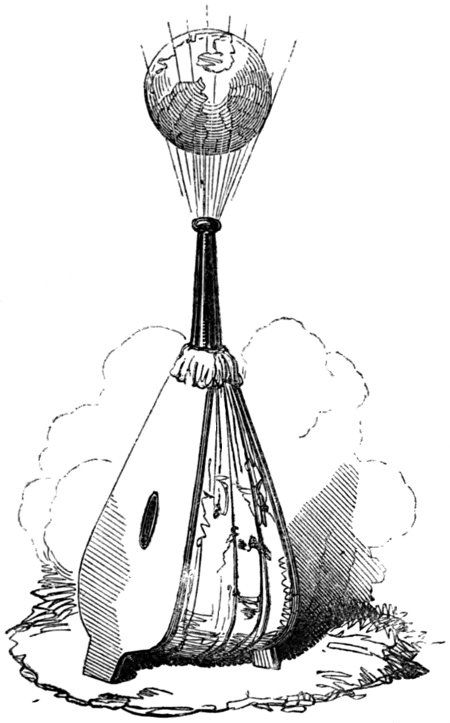
THE WORLD IS KEPT UP BY PUFF.
R. CLAY, PRINTER, BREAD STREET HILL, LONDON.
[178] NEW EDITIONS OF POPULAR WORKS.
WILLIAM BECKFORD, ESQ.
ITALY;
WITH SKETCHES OF SPAIN AND PORTUGAL, AND AN EXCURSION TO
THE MONASTERIES OF ALCOBACA AND BATALHA.
By William Beckford, Esq. Author of "Vathek." Embellished with a fine Portrait of
Mr. Beckford, from the original painting by Sir Joshua Reynolds. Price 6s. neatly
bound.
WASHINGTON IRVING, ESQ.
ASTORIA.
By Washington Irving. With Portrait. Price 6s. neatly bound.
W. H. MAXWELL, ESQ.
WILD SPORTS OF THE WEST.
By W. H. Maxwell, Esq. Author of "Stories of Waterloo," &c. With Fifteen Engravings.
Price 6s. neatly bound.
MRS. TROLLOPE.
DOMESTIC MANNERS OF THE AMERICANS.
By Mrs. Trollope. With Fifteen Engravings (including a Portrait of
Mrs. Trollope). Price 6s. neatly bound.
CAPT. CHAMIER, R.N.
THE LIFE OF A SAILOR.
By Capt. Chamier. With Engravings. Price 6s. neatly bound.
REV. G. R. GLEIG.
TRADITIONS OF CHELSEA HOSPITAL.
By the Rev. G. R. Gleig. With Portrait of the Author. Price 6s. neatly bound.
[179]NEW WORKS OF WIT AND HUMOUR
I.
In Two Vols. 8vo. with numerous Illustrations by Leech,
THE INGOLDSBY LEGENDS;
OR, MIRTH AND MARVELS.
BY THOMAS INGOLDSBY, ESQ.
*** Either series may be had separately, in One Volume, price 10s. 6d.
II.
In One Volume, post 8vo. with upwards of Eighty Illustrations by Leech, price 10s. 6d.
THE WASSAIL BOWL.
BY ALBERT SMITH, ESQ.
III.
In Two Volumes, post 8vo. with One Hundred and Fifty Illustrations, price 18s.
CROWQUILL'S COMIC SKETCHES;
OR, THE PHANTASMAGORIA OF FUN.
IV.
In post 8vo. with upwards of Fifty characteristic Illustrations by Leech, price 8s.
THE COMIC ENGLISH GRAMMAR.
By the Author of "The Comic Latin Grammar."
V.
In Two Volumes, post 8vo. with numerous Illustrations by Leech, &c. including several
fac-similes of rare and unique old Prints, price 21s.
MERRIE ENGLAND IN THE OLDEN TIME;
OR,
Peregrinations with Uncle Tim and Mr. Bosky, of Little Britain, Drysalter
BY GEORGE DANIEL.
VI.
In One Volume, post 8vo. with numerous Illustrations by Leech, price 10s. 6d.
THE PORCELAIN TOWER;
OR, NINE STORIES OF CHINA.
BY T. H. SEALY.
RICHARD BENTLEY, NEW BURLINGTON STREET.
*** TO BE HAD ALSO OF ALL BOOKSELLERS.
[180] Now in course of publication, in neatly bound pocket volumes, price Six Shillings each, printed and embellished with Engravings uniformly with the "Waverley Novels," to which they are suitable companions,
The Standard Novels and Romances.
THIS COLLECTION NOW CONTAINS
The New Volume, just published, comprises
JACQUELINE OF HOLLAND,
AN HISTORICAL TALE,
By THOMAS COLLEY GRATTAN, Esq. Author of "The Heiress of Bruges," &c.
*** Any Volume may be had separately, and of all Booksellers.
FOOTNOTES:
[2] Any one wishing to observe this great lesson to all mankind set forth by the leading journal of Europe, has only to look at the little vignette at the top of the leading article of the "Times."
[3] Notwithstanding the "pretty considerable declension" of mercantile integrity, the character of the British merchant, both at home and abroad, still maintains its ascendency, and there are yet thousands of "merchant princes" who fully sustain the honour and glory of our native land. This satire is launched against the "cutting" commercials of the age.
[4] Whatever may be said of the mode of collecting tithes, nothing can be said against the "right of tithe." The clergy are the greatest sufferers, and no consummation is more devoutly to be wished than an equitable adjustment. As things are at present, the clergy do not get half their dues, and these are obtained in a manner well calculated to keep up the idea of a certain person shearing the hogs, "great cry and little wool."
[5] I can't make wriggle rhyme to fiddle. I have sent it to the prince of wrigglers, Lord B——, and to the prince of fiddlers, Mr. P—, but they refer me to Mr. Wordsworth.—T. W.
[6] A favourite maxim with a certain reverend city orator, formerly a "grocer," and still a "grosser" man than his neighbours.
[7] These loans are of course fictitious, but their signatures may be valuable to get clear out.
[8] Sir Walter Scott, in one of his walks, found a turnip, resembling in some degree the bumble-head of a Scotch feelosopher. He made a cast of it, and sent it to the Phrenological Society of Edinburgh, who pronounced a long dissertation upon it, and gave the moral and intellectual qualities with extraordinary correctness.
Transcriber's Corrections:
| page | original text | correction |
| 42 | "titavating" | "titivating" |
| 100 | repecting | respecting |
| 142 | gingens. | gignens. |
| 154 | 2,500 widowers without families. 2,500 widowers with families. | 2,500 widowers. |
| 168 | Cobbet's | Cobbett's |